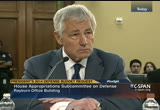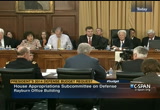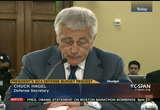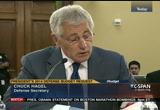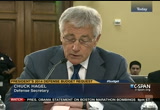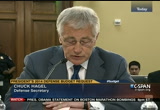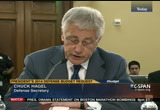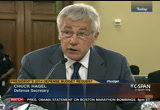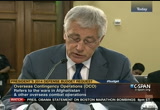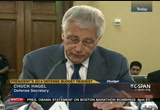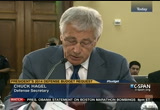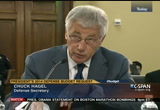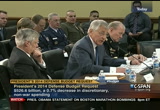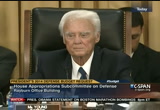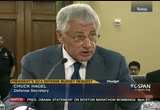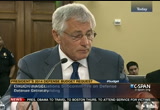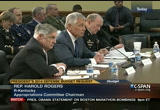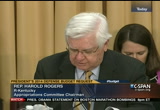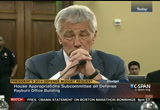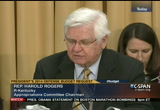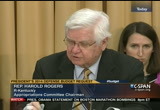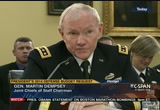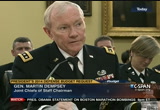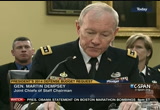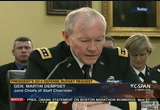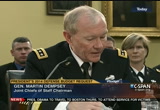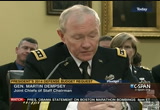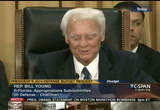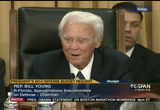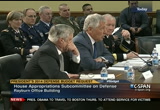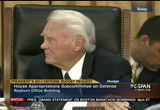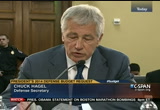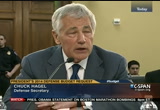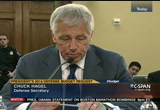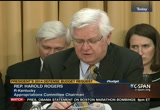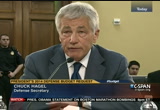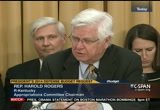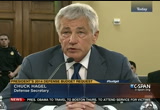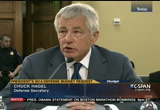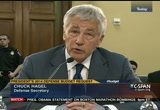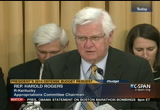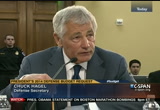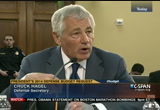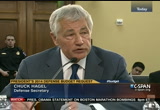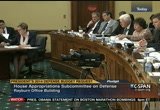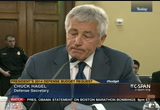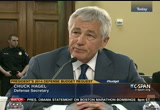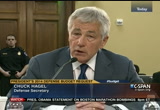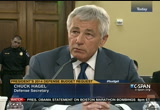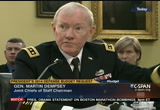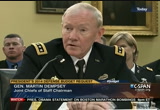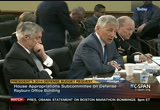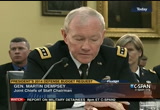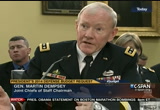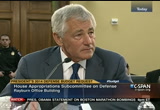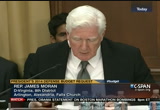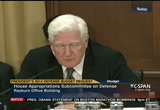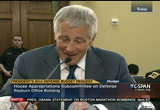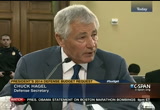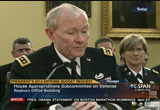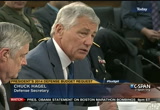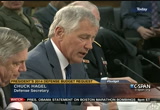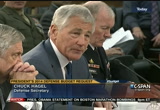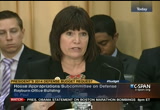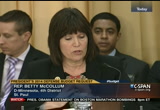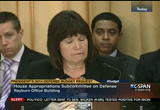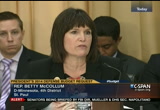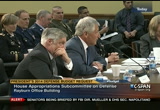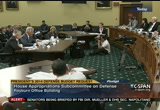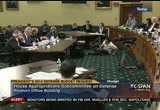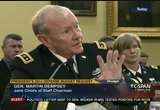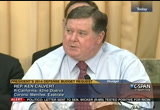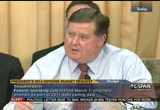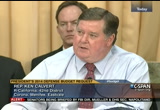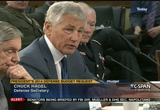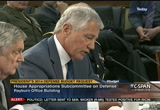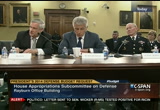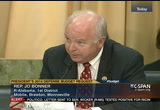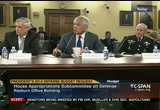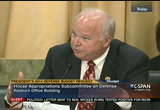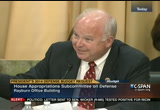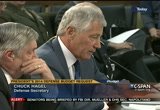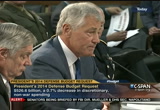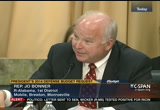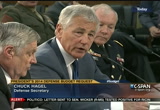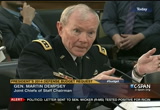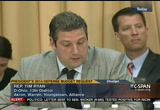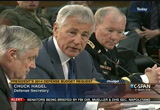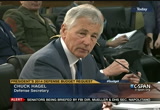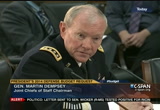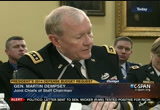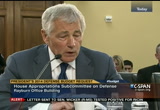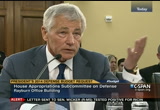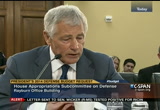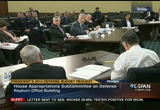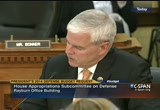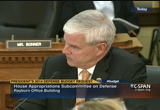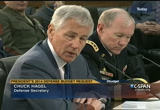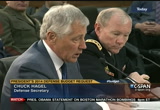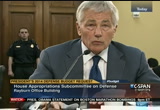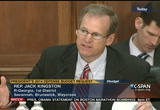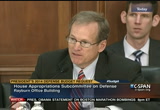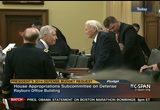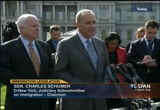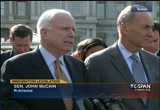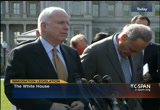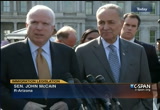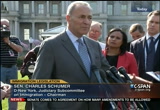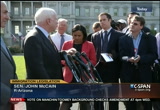tv Public Affairs CSPAN April 16, 2013 5:00pm-8:00pm EDT
5:00 pm
of very challenging actions in this regard. i would be remiss if i did not also suggest that congress has a responsibility here too. the department as well as every agency of the federal government was operating under a continuing resolution for the last seven months. that also leads to great inefficiencies and burdens to you and everyone else that you represent today. that's certainly looking forward, needs to desist. aside from sequestration, we recognize that this budget comes at a time of enduring fiscal challenges. among the items in your budget, the budget protects personnel by including a modest pay raise, increasing housing and subsistence allowances and requesting $8.5 billion in family-related programs. . i look forward to working in partnership with you on how to strike a balance between
5:01 pm
supporting personnel, while at the same time controlling costs in this segment of the budget and would conclude that congress has the responsibility here, too. we look upon you, the general and others to make difficult decisions in your budget submission. we are going to have to look to be a partner and make difficult decisions as well going forward. i acknowledge that and look forward to your testimony again. mr. secretary, sorry we interrupted your statement, but we are prepared to hear from you and looking forward to your statement today. >> mr. chairman, thank you. i'm grateful, mr. chairman, for an opportunity to appear before this body this morning, ranking member visclosky, thank you and all the members of the
5:02 pm
committee, thank you for this opportunity. i got my start on this side of the capitol, working for a congressman who you came to this body with, from nebraska, elected in 1970. was his chief of staff for five years. i was grounded i hope in responsible governance on this side of the house and have always appreciated that experience as a young man. it did shape my view of the world and governance and responsibility. i don't know if that gives me any additional credibility in this body, but nonetheless, i wanted to note that because it has been a big part of my life that i have drawn from for many years, the different things i have done and the opportunities i have had. >> mr. secretary, he was one of
5:03 pm
my closest friends when we came here together many, many years ago. >> he's doing well and i will give him your regards. mr. chairman, ranking member visclosky and other members of the committee, before i begin my prepared remarks on the budget today, let me say a few words about what happened in boston yesterday. like all americans, our thoughts and prayers of our people at d.o.d. and all of washington are with the people of boston today, especially the families of the victims and those injured by what appears to be a cruel act of terror. as the president said yesterday, we still do not know who did this or why. and a thorough investigation will have to determine whether it was planned and carried out by a terrorist group, foreign or
5:04 pm
domestic. it's important not to jump to conclusions before we have all the facts, but as the white house said last night, any event with multiple explosive devices as this appears to be is clearly an agget of terror and will be approached as an act of terror. the president has made clear we will find out who did this. we will find out why they did this and any responsible individuals or groups will be brought to justice. i would like to commend local, state and federal law enforcement agencies for their quick response to yesterday's tragic events and also express our gratitude to the members of the national guard supporting the marathon, among the first on the scene. i'm mindful that many members of the military community had traveled to boston to participate in this race and our thoughts are with all of them today. the department of defense is prepared to respond quickly to
5:05 pm
any response for additional support from domestic law enforcement agencies. i will continue to consult closely with d.o.d. senior leaders on how we can best support the government's response and investigation. and chairman dempsey may have additional comments regarding this event as well. mr. chairman, i will now turn to my opening statement for this hearing. this year's 2014 budget request for the department of defense is -- as congressman lowey noted, a budget that was put together over many months. an enterprise as large as the department of defense, $600 billion is not collaborated with
5:06 pm
or on or numbers or budgets instructed in a manner of two or three months. and as we proceed in this hearing this morning, mr. chairman, we will get into some of the specifics of the budget and why some of the decisions were made on the basis of what the numbers will reveal and our responsibilities. allow me to express my appreciation to this subcommittee for its continued support of our men and women in uniform and our civilian work force. they are doing tremendous work, as you all know, and are making great sacrifices, along with their families ks as they have more than 11 years in our nation's wars. their dedication and professionalism are the foundation of our military strength and as we discuss numbers and budgets and strategic priorities today, i know we will not lose sight of
5:07 pm
these men and women and their families serving across the globe at great sacrifice. as you all know, their well-being depends on the decisions we make here in washington. today, the department of defense faces the significant challenge of conducting long-term planning and budgeting in a time of considerable unsesht, both in terms of the security challenges we face around the world and the levels of defense spending we can expect here at home. even as the military emerges and recovers from more than a decade of sustained conflict in iraq and afghanistan, it confronts an array of complex threats in varying degrees of risk to the united states. these include the persistence of violent extremism and ungoverned spaces in the middle east and north africa. the proliferation of dangerous weapons and materials. the rise of new powers competing for new influences.
5:08 pm
the risk of regional conflicts which could draw in the united states. faceless, nameless, sigh lent and destructive cyber attacks. debilitating and curse of human despair and poverty as well as the uncertain implications of environmental degradation. the pace of technology change and spread of advanced military technology to state and nonstate actors pose an encreasing challenge to america's military. this is the environment that is facing the department of defense as it enters a third year of flat or declining budgets. the onset of these constraints has led to belt tightening in military modernization, force structure, personnel costs and overhead expenditures. it has given us the opportunity to reshape the military and reform defense institutions to
5:09 pm
better reflect 21st century realities. the process began under the leadership of secretary gates. secretary gates curtailed more than 30 modernization programs and trimmed overhead costs within the military services and across the defense enterprise. the realignment continued secretary panetta who crafted new strategic guidance in an f.y. 2013 defense budget plan which reduced the department's top line by $487 billion over the course of a decade. the president's request of $526.6 billion for fy 2014 continues to implement the president's defense strategic guidance and enhances the department's efforts at institutional reform. most critically, it sustains the quality of the all-volunteer force and the care we provide our service members and their families, which underpins
5:10 pm
everything we do as an organization. before discussing the particulars of this budget request, however, allow me to discuss the profound budget problems facing the department in 2013 and beyond as a result of sequester. the congress and the department of defense have a responsibility to find answers to these problems together, because we have a shared responsibility to protect our national security. d.o.d. is going to need the help of congress. we are going to need the help of congress, this subcommittee, to manage through this uncertainty. the f.y. 2013 d.o.d. appropriations bill enacted by the congress last month addressed many urgent problems in our budget by allocating d.o.d. funding more closely in line with the president's budget request, giving the department authorities to start new programs. and allowing us to proceed with important military construction projects. nonetheless, the bill still left
5:11 pm
in place, the deep and abrupt cuts associated with sequester, as much as $41 billion in spending reductions over the next six months. military pay and benefits are exempt from the sequester and we made a decision to shift the impact of sequester away from those serving in harm's way. the military is experiencing higher tempos and higher transportation costs when the budget request was formulated more than a year ago. as a result of these factors, the department is facing a shortfall in our operation and maintenance accounts for f.y. 2013 of at least $22 billion in our base budget for active forces nfment response, the department has reduced official travel, cut back sharply on facilities maintenance, imposed hiring freezes and halted many other important but lower priority activities. however, we will have to do more. we will soon send to congress a large reprogramming request
5:12 pm
designed to offset some of our shortfalls, especially shortfalls in wartime funding and we ask your help with their speedy review and programming thfment will be limited by ceilings on transfer of authority and can only solve part of the problem. we will have to continue to consider furloughing the civilian personnel in the months ahead. there will be significant cuts in maintenance and training which further erodes the readiness of the force and will be costly to are regain in the future. as the service chiefs have said, we are consuming our readiness. meanwhile, our investment accounts in the defense industrial base are not spared damage. as we also take indiscriminate cuts. we will continue to need the strong partnership of this committee to help us address the shortfalls. if the provisions of the budget control act of 2011 are not changed, the f.y. 2014 budget
5:13 pm
will be reduced to a cap and cut d.o.d. funding by $52 billion and if there is no action by the congress, $500 billion cuts will be required over the next nine years. the president's budget proposes some $150 billion in additional defense savings over the next decade. these cuts are part of a balanced budget of deficit reduction. these cuts are backloaded, occurring mainly in the years beyond f.y. 2018, which gives the department time to plan and implement the reductions wisely and responsibly, anchored by the president's defense strategic guidance. let me turn to the details of the president's budget request. $526.6 billion budget request addresses the compelling demands of supporting troops in
5:14 pm
afghanistan, protecting readiness, modernizing the military's weapons inventory and in keeping with the president's strategic guidance and sustaining the quality of the all-volunteer force. today's budget request contains a placeholder request, mr. chairman, for overseas contingency at the f.y. 2013 vel, and the submission does not include a formal request because afghanistan force levels and deployment decisions for this year were delayed in order to provide commanders enough time to fully assess requirements. we will be smithing a budget with the -- submitting a budget and account level detail. the base budget continues the department's approach over the last several years. first, a target growing costs in support, acquisition and pay and benefits before cutting military capabilities and force
5:15 pm
structure. this budget identifies new savings of about $34 billion in f.y. 2014-2018, including $5.5 billion in f.y. 2014 from all of these areas nfment order to maintain balanced readiness, the department of defense must be able to eliminate excess infrastructure as it reduces force structure. d.o.d. has been shredding infrastructure in europe for several years and we are undertaking a review of our european footprint this year but we need to look at our domestic footprint. the president's f.y. 2014 budget request authorization, one round of base realignment and closure, brac. brac is a comprehensive and fair tool that allows communities a role. and provides redevelopment assistance. brac is an imperfect process, as we all know.
5:16 pm
and there are upfront costs for brac. the future year defense program adds $2.4 billion to pay for these costs. but in the long-term there are significant savings for brac. the previous five rounds are saving $12 billion annually and those savings will continue. in this budget, the department has achieved $8.2 billion from weapons programs terminations and restructuring. for example, revising the acquisition strategy for the army's ground combat vehicle, the department will save over $2 billion in development costs nfment other costs, the department developed new capabilities instead of relying on leap-ahead gains in technology. the cost of military pay and benefits are another significant driver of spending growth that must be addressed in the current fiscal environment. in this budget, the department is submitting a new package of military compensation proposals
5:17 pm
to take into consideration congressional concerns society wd those from f.y. 2013. these changes save about $1.4 $12.8 in 2014 and billion from 2014-2018. this package includes a modest slowing of military pay by implementing a 1% pay raise for service members in 2014. the department is seeking additional changes to the tricare program in the f.y. 2014 budget to bring the beneficiaries' cost share closer to the levels envisioned when the program was implemented. survivors of military members who died in office and on active duty or medley retired members who would be excluded from all tricare increases. even after the proposed changes in fees, tricare still remains a very substantial benefit.
5:18 pm
these adjustments to pay and benefits were among the most carefully considered and difficult choices in the budget. they were made with the strong support of the joint chiefs of staff and the senior enlisted leadership. in recognition that in order to sustain these benefits over the long-term, without dramatically reducing the size or readiness of the force. these rising costs need to be brought under control. the longer we wait, the more difficult it will be. nevertheless, spending reductions on the scale of the cuts t drawdown cannot be alone. force structure and modernization programs will also be required. the strategic guidance issued in january, 2012 set the priorities and informed those choices in the f.y. 2014 budget submission, further implements and deepens program alignment. the new strategy calls for a
5:19 pm
smaller and leaner force, a more agile force. last year we proposed reductions of $100,000 of military end strength between 2012 and 2017. most of those reductions occur in the ground forces and are consistent with the decision not to size u.s. ground forces to accomplished prolonged stability operations whale maintaining adequate capability should such activities again be required. by the end of f.y. 2014, we will have completed two-thirds of the drawdown of our ground forces and should be fully complete by f.y. 2017. increased emphasis on the middle east and asia pacific represents a key tenet. this budget puts a premium on rapidly deployable self-sustaining forces such as submarines, long-range bombers that can project power over great distance and carry out a
5:20 pm
variety of missions. this new strategy leverages new concepts of operation enabled by advances in space, cyber space, special operations, global mobility, precision strike, missile defense and other capabilities. by making difficult tradeoffs and lower priority rates in areas, the f.y. 2014 budget protects or increases key investments in the critical areas of critical capabilities. another critical area of focus in this budget request is sustaining the readiness and quality of the all-volunteer service. the high quality of our all-volunteer force continues to be the foundation of our ilitary strength and f.y. 2014 budget request includes $137.1 billion for military personnel as well as $49.9 billion for military medical care. together they make up one-third of our base budget. this budget seeks to ensure that
5:21 pm
our troops receive the training and equipment they need for military readiness and the world class support programs they and their familiar l list have earned. the department continues to support key programs in f.y. 2014 that supports service members and their families, $8.5 billion on initiatives that include transition assistance and veterans employment insurance, behavioral health, family readiness, suicide prevention and sexual assault prevention and response. the budget is a reflection of d.o.d.'s best efforts to match ends, ways and means during a period of intense fiscal uncertainty. it is obvious that significant changes to the department's top-line spending would require changes to this budget plan. the department must plan for any and all additional reductions to the defense budget that might result from a congress and administration agreeing on a deficit reduction plan.
5:22 pm
it must be prepared in the event that sequester level cuts persist for another year or over the long-term. consequently, i direct add strategic choices and management review. i asked for that review in order to assess the potential impact of further reductions up to the level of full sequester. the purpose of this review is to reassess the basic assumptions that drive the department's investment and force structure decisions. the review will identify the strategic choices and further institutional reforms that still may be required, including those reforms which should be pursued regardless of fiscal pressure. it is designed to help understand the challenges, articulate the risks and look for opportunities, opportunities for reform and efficiencies, presented by resource constraints. everything will be on the table. everything will be on the table during this review. roles and missions, planning,
5:23 pm
businesses practices, force structure, personnel and acquisition, modernization investments, how we operate and how we measure and maintain readiness. this review is being conducted by deputy secretary carter working with general dempsey. the service secretaries and service chiefs and combatant commanders all serve as essential participants. our aim is to conclude this review which is now under way and has been under way by may 31 of this year. the results will inform our 2015 budget request and will be the foundation for the quadrennial defense review due to congress in february of next year. it is already clear to me that achieving significant additional budget savings without unacceptable risks to national security will require not just tweaking at existing practices,
5:24 pm
but fashioning entirely new ones that better reflect 21st century realities and will require the partnership of cofpk. the f.y. 2014 budget and the ones before it have made hard choices. in many cases, modest reforms to personnel and benefits and reducing infrastructure and restructure programs met fierce political resistance. we are now in a different fiscal environment dealing with new realities that will force us to more fully confront these tough and painful choices and make the reforms we need to make to put this department to maintain our military strength. but in order to do that, we will need flexibility. we will need time. and we will need some budget certainty. we will need to fund the military capabilities that are necessary for the complex security threats. i believe the president's budget does that.
5:25 pm
with the partnership of congress, the defense department can continue to find new ways to operate more affordbly, efficiently and effectively. however, multiple reviews and analysis show that additional major cuts, especially those on the scale and time line of sequestration would have dramatic reductions in core military capabilities or the scope of our activities around the world. as the executive and legislative branches of government, we have the shared responsibility to ensure we protect national security and america's strategic interest. we should make every decision on the basis of enduring national interest and make sure every policy is worthy of the service and sacrifice of our service members and their families. mr. chairman, thank you. >> mr. secretary, thank you so much for your very thorough statement and the challenges that your department faces and
5:26 pm
the challenges that we face. .xcellent you recall, i mentioned he made the speech on the floor. mr. rogers, mr. chairman, you are recognized. >> thank you, mr. chairman, for yielding. mr. secretary, congratulations on your confirmation to this very important post and welcome back, general dempsey and secretary hale to this subcommittee. we thank you for being here today to share your thoughts on the 2014 budget request. in other subcommittee hearings, i have already lamented the fact that this budget request is
5:27 pm
woefully late and full of gimmicks, tax increases, generally unhelpful, but we will persevere. let me begin by taking the opportunity to thank the members of the military for their service, their sacrifice that you are representing here today. as this subcommittee has done in the past, we want to reaffirm our commitment to providing our war fighters with the tools, the training, the equipment and the support necessary to carry out vital security missions throughout the world. appreciation for the members of the military and their service can't be overstated. with continued instability in
5:28 pm
the middle east and northern africa, to the evolving challenges in the asia pacific region, especially north korea, there's no question that those who serve under our flag these days are doing so during a very critical period in our history. world events often remind us that our country, our freedom, our way of life remain a constant risk and we must take measured steps to protect the values that we hold. in this volatile world, increasingly, we are facing enemies both foreign and domestic. we are now confronted with a very serious fiscal problem at home, as you have described, mr. secretary, from skyrocketing entitlement programs, trillion dollar deficits, to a fledgeling economy and declining military -industrial base. we can now add to that the devastating effects of
5:29 pm
sequestration to our servicemen and women. sequestration is the wrong approach to bring in spending, particularly as our nation's military readiness will foolishly suffer. however, we are under sequestration. and i hope you can clarify for me some of its impacts. we have recently heard that the army has canceled seven combat center training rotations, the navy has canceled ship deployments. air force has stood 12 combat-coded squad rons, not to mention potential civilian furloughs for up to 14 days all due to sequestration and i hope you can translate that into the real world for us, including what that means in terms of readiness and force posture. we'll continue to wrestle with
5:30 pm
these issues with you. i'm very happy and pleased to see during the fiscal 2013 c.r. that we were able to include the full year defense and veterans -- milcon and veterans bills, giving you some much needed flexibility in funding for d.o.d. past three years we worked across the aisle, across the capitol demonstrating the commitment of members and staff alike to restore regular order and it's my goal to continue that process in fiscal 2014, with an eye of looking out for our men and women holding the line on our security. we have some very tough choices ahead for us and you and i appreciate your commitment to doing what we have to do to control the spending and also to maintain that readiness.
5:31 pm
thank you, mr. chairman. >> mr. chairman, thank you very much. we are happy to have you back again. it is always good testimony that comes from your shop. we appreciate the challenges that you have as chairman of the joint chiefs. you have a team that is outstanding that work with you. at this point, we are very happy to receive your testimony, sir. >> thank you, chairman, ranking member visclosky, chairman and ranking member from the full committee and i'm honored to do it. we go back a long way and there are some incredibly complex issues facing us but it's a time to exert a little leadership and i'm happy to do it and proud to do it with the members of this committee and the remainder of this congress. i would like to add my thoughts and prayers to those who
5:32 pm
suffered from the act of terror in boston and to the massachusetts national guard who were among the first responders and who continue to float as necessary to assist local law enforcement. and finally to assure everyone we have been in contact both with the state and governmental officials and stand ready to support in any way. i do welcome this opportunity to update you on the state of the armed forces and also to discuss with you the fiscal year 2014 budget submission. this hearing comes at a time of extraordinary uncertainty. as resources decline, the risks to our national security go up. it's in this context that i offer my perspective of how we can work together to sustain a balanced and fearless force. one thing is certain, our men and women are steadfast in their courage and in their devotion to duty. i could see it in their eyes of
5:33 pm
those that i had the honor of meeting just recently in afghanistan, but also of re-enlisting into the further service of their country. in afghanistan, our forces are simultaneously fighting, transitioning and redeploying and the military will take the operational lead for security across the country. as they gain confidence, so, too, do the people of afghanistan gain confidence. the coalition will remain in support as we transition to a sustainable presence in the post-2014 environment. our responsibility is to make sure that the mission matches the levels of force that remain there to do the mission. our joint force has been vigilant elsewhere as well. we are detering aggression in northeast asian assuring our allies in the face of provocation by north korea and southeast asia by -- i'm sorry
5:34 pm
in the middle east by iran. we are working with our inner agency partners to protect the nation against cyber attack and we are acting directly and with partners to defeat al qaeda. we are rebalancing to the asia pacific and adapting our force posture to a new normal of combustible violence in north africa and the middle east and we are working with others to keep syria's conflict from destabilizing the entire region. we are prepared with options should military force be called upon and assuming that it can be used effectively to secure interests without making matters worse. we must be ready for options of a future that we have not yet identified. this budget was purpose-built to keep the nation immune from coercion. it aims to restore our versatility to a more affordable joint force in support of our
5:35 pm
defense strategy. but let me be clear about what this budget does not do. this budget does not reflect the full sequestration amount. it does impose less reduction and give us more time. however, uncertainty persists about what the top line will be in this or any other budget. nor does it include funds to restore lost readiness. we don't know what the full impact of this year's challenges has had on our readiness. we are accumulating the information necessary, but what we don't know that readiness shortfall is not accounted in the 2014 budget and that's concerning. we have already curtailed or canceled training from many units across the services, that is those who are not preparing to deploy. and we should all know that it's more expensive to restore readiness than it is to maintain it. recovery costs, therefore, will compete with our ability to
5:36 pm
build the joint force in the out years. this budget does invest in our priorities, as the secretary said. it does keep the forces imbalance and upholds funding for emerging capabilities such as cyber and funds those conventional and nuclear capabilities that have proven so effective in keeping our nation safe and defense secure and lowers manpower costs. reduces excess infrastructure and makes health care more sustainable. most importantly, it invests in our true decisive advantage, which is our people. it treats being the best led, the best trained and best equipped military as the nonnegotiable imperative. never has our nation sustained such a lengthy war solely through the service of an all-volunteer force. we must honor our commitments to them. returning veterans returning home is a struggle seen and
5:37 pm
unseen. we have to continue to invest in world class treatment for traumatic brain injury and combat stress and we have the shared responsibility to address the urgent issue of suicide within the ranks and address it with the same devotion with protecting their lives in combat. the risks must never include the risk of sexual assault. sexual assault betrays the trust on which our profession is founded and we will drive this crime from our ranks. in many ways, this is a defining moment for our military. our warriors' will to end is undaunted but the means are becoming somewhat uncertain. we have the opportunity, i would suggest, an obligation with this and any future budget to restore confidence. we have it within us to stay strong as a global leader and as a reliable partner. the joint force is looking to us
5:38 pm
to lead them through this period of historic fiscal correction. we can't do it alone. we need budget certainty, we need time and we need flexibility and that means a funding stream and means the time to deliberately evaluate the tradeoffs in force structure, modernization, compensation and readiness and means the full flexibility to keep the full force imbalance. thank you what you continue to do to support our men and women in uniform. i ask that you continue to support a responsible investment in the nation's defense. and i look forward to your questions. >> mr. chairman, thank you very much. you anticipated a number of our questions in your statement. so we appreciate that. i'm going to move quickly and watch the time limits pretty
5:39 pm
closely but i want to take a couple of minutes and i appreciate the comments that both of you made relative to the national guard and the response in boston yesterday. i want call attention to the fact that the national guard, 24 civil support team, which has been scheduled to be disestablished. and the congress questions that. congress in the national defense act last year, congress authorized the two civil support teams that are scheduled to be disestablished and this committee funded those two. but you still intend to disestablish them. but i wanted to call attention to the fact that one of those that you want to disestablish was the one that responded yesterday to the boston marathon bombings. the other one is the only
5:40 pm
maritime civil support team that we have in the united states. it's the 48th, which is located near mack dill air force base which is the home of central command. question this disestablishment of these civil support teams that you have talked about today without mentioning who they were. i -- if you want to respond to that, that would be fine. >> thank you. chairman rogers, nice to see you. thank you. if you are referring to the two teams in new york and florida? >> yes, sir. >> there is money in the budget for those. and i think we have sent that up to the hill. new have funded both the
5:41 pm
york and the florida. >> on the 29th of march, a letter from your department notified the defense committees of your intent to disestablish those two c.s.t.'s. so i thought i would remind you that these are important teams. congress is very, very supportive of those teams. >> they are important and we have put the funding in both of those. and congress was informed of that the last few days and we put the money back in. >> ok. thank you. mr. visclosky. >> thank you, mr. chairman. mr. secretary, just two issues, because we will be short on time. on the issue of the department preparing audible financial
5:42 pm
statements, i do have a number of questions for the record, but audit and to achieve readiness for fiscal year 2014 and meeting legal requirements for full audit readiness by 2017. do you think this is an important initiative? i always get concerned whether it's d.o.d. or any other department where goals are pushed out four or five years. a year from now we are talking about it being 2018 or 2019. i want to emphasize i attach a lot of importance. >> i strongly support that effort. and as you know my predecessor, congressman panetta, when he was in this job, was very supportive of the effort. we intend to make those deadlines and we will do everything to fulfill that commitment. >> appreciate that very much.
5:43 pm
the other question i have is on the integration of electronic health records. in the fiscal year 2008 national defense authorization act, there was a direction to the department of defense as well as the veterans administration to develop a single electronic health care system that would follow a service member from the time he or she enlisted until the time they exited into v.a. care. the original goal was 2009. the new completion date has slipped to 2017. my understanding is that the issue of whether there be one core system or two systems that would integrate information between the departments is one of the issues and apparently there is a decision pending in d.o.d. the veterans administration believes that d.o.d. should use an existing system that is proprietary to the united states
5:44 pm
government and again i have questions for the record, what's your impression as far as the integration of these systems and where are we today, if i could ask? >> thank you. first, the secretary of defense and the secretary of veterans affairs continue to work very closely the first week i was in office. i went over to the v.a. and spent an hour and a half with secretary shin secretaryy on issues on nd other the integrated health care system. interopera built is the real key ensuring there is electronic transfer highways. we produce the veteran, d.o.d. and there should be a seamless process that allows a veteran to
5:45 pm
have assurance and rebiblet in that his or her records are moved to the v.a., whether it's a claims adjustment issue, claims filing issue or whatever. that is still our goal. we continue to work with the v.a. we had a meeting yesterday on the efforts. we have a team in place that the v.a. requested from d.o.d. on this. there have been programs and progress made. we're not where we should be. we're not where we committed to be. but we will get there. but i think the key -- the interoperability of our systems and as you noted, the v.a. has selected vista as its system. we are behind in that process, d.o.d. and i, over the last few weeks, have gotten into this issue myself.
5:46 pm
and we're going to do some restructuring within d.o.d. so that we have more clear lines of authority, accountability, who's in charge, how's it going to get done. i'm not an expert on this issue, but when i was at the v.a. as deputy administrator in 1981 and 19 82, i implemented the first electronic systems. i'm out of my depth, i recognize on this, but i have some knowledge on this and i know it's difficult and the v.a. is faced with a tremendous amount of backload issues. so we are working with them in every way, not where we need to be, but we will continuity as a top priority. >> would the gentleman yield? i wanted to associate myself with the ranking member's members questions and concerns.
5:47 pm
i thank you. >> i appreciate that. you referenced the backlog at v.a. and anything we can do to improve that would be welcome. thank you, mr. chairman. >> mr. rogers. >> mr. secretary, let me ask you about china. nd related topics. last few months ago, i was in the phillipines and the president was very concerned about the chinese claims on the south china sea, that they were, in his judgment, violating international laws and norms in controlling that very vital shipping lane for the world's commerce. what can you tell us about the south china sea and china's
5:48 pm
apparent efforts to control it to everyone else's exclusion? >> well, i'm well aware of the issue with the island dispute. as you know china has an island dispute not only with the filipinos, but with the vietnam and other nations and japan. and that's one of the reasons that two years ago, the president made a decision in his defense strategic guidance as to rebalance our priorities to asian the pacific. we have been a pacific power. we will continue to be a pacific power. we need to be a pacific power. if for no other reason and the issue you identified, the ceilings. we are still the most significant navy in the pacific. we will continue to be. we need to be.
5:49 pm
much of the budget focus that we put on as chairman into prioritizing our resources is to assure that that rebalancing is not eroded. we have allies there and relationships there. and it is in our interests that the sea lanes remain open and we will protect those sea lanes. >> 80%, i'm told, of the world commerce travels through the straits in the south china sea control ina decides to that shipping lane, it would have tremendous impact all around the world. countries like japan and all the others in that region. it would be devastating. are we prepared to keep those lanes open? >> we are prepared.
5:50 pm
you are specifically referring to the straits of malaka, which i was just there in august, and you identified it directly. i think in response to anticipated threats and challenges, as you know have made new arrangements in singapore with a rotation with our lattoral ships in and out of that area. we have moved as a result of hifting marine capacity off of japan to guam and to northern australia. we are working closely with our allies and much is predicated on assuring those sea lanes remain open. >> let me close by asking briefly about cybersecurity. most people have concluded that
5:51 pm
the -- that many of the attacks on our systems in this country are coming from china. and are state-sponsored. but this is the new warfare of the future. ap -- and do you feel we are prepared to defend ourselves from these attacks and what can you tell us about our preparedness? >> well, cyber is one of the areas in this budget where we have proposed increases of considerable increases, more people, more capacity. you also know that we have an interagency dimension to this. department of homeland security has most of the domestic authority. we, too, have authority to
5:52 pm
protect our interests. n.s.a. and cyber command are the two main areas of expertise and responsibility. you have correctly identified the greatest threat to our security, economic security, political security, diplomatic security, military security that confronts us. not to minimize other threats. we are prepared and are preparing and strengthening that capacity to deal with these issues. we do know that these attacks are coming from two or three countries. we are dealing with china, talking to china about this. the chairman is going to be in china, which he will, i'm sure, to this area or any other area that you talk about specifically on cyber. and when he is there in china,
5:53 pm
will address this issue. it is a serious issue. and we are talking to the chinese about it. but overall, the cyber threat is a very real threat to this country. >> it is. and it's going to get worse and i think we have to take action with china to stop the p.l.a. from bottom barreding us hourly with these hack attacks. they have stolen all sourts of weaponry from us and research, even the m-35 and i would hope that the department would be much more aggressive on the cybersecurity front. mr. chairman, thank you. >> mrs. lowey. >> thank you, mr. chairman. and i thank you, secretary
5:54 pm
hagel, general dempsey, secretary hale for your comments. secretary hagel, i do hope you will follow up on your statement regarding support for the two national guards teams. it is my understanding that d.o.d. sent a march 29 letter to congress notifying they are moving forward with de-establishing florida and new york national guard civil support teams. i'm hoping your statement for the record will keep those teams on duty, as we all express our heartfelt sympathy by those who were impacted by the tragedy in boston. we know the national guard teams were there before and they stayed and they were invaluable. so does your statement that you will keep them stand for the record? >> it does stand for the record. >> i thank you so much.
5:55 pm
and i would like to follow up on our distinguished ranking member's question regarding the veterans' claim backlog. general dempsey, you said the men and women in uniform, their , but we to our country have been neglecting them and it's important to state for the record that since 2008, the department of defense and rett advance -- veterans have spent have an $1 billion to electronic records. i was going to show pictures of the boxes at the department of defense, boxes -- and you can't believe that it is still in boxes of records that haven't been dealt with. as we know, the departments use
5:56 pm
separate medical data bases nor can translate the data in a fundamental way. there are 600,000 veterans who have served our country with such distinction waiting 125 days or more to have their medical claims processed. shame on us. the v.a. annual claims receipts are expected to reach 1.2 million in 2013, an increase of almost 60% since 2005. i cannot adequately express to you how outraged i am with this situation. i have talked to many people trying to get the facts, and frankly, mr. secretary, i do hope you're going to focus like a laser, as well as general dempsey, on this issue. cause although secretary
5:57 pm
shinseki takes most of the blame, most say it is the department of defense although the v.a. may have the primary ponce built. d.o.d. has contributed -- responsibility. d.o.d. has contributed to the problem. now i'm not an expert, as you said, on the system, but if the v.a. is using the vista system, it is reasonable to assume that d.o.d. should either use that system or another that works seamlessly with vista. you said you want to fix this. $1 billion already spent and the secretary of defense and general dempsey, all of us want to fix it. vista at least being considered? if you pursue a different system, what guarantees it will
5:58 pm
work after five years of failure? and how long would it take to implement the system? when can we expect an announcement? it's hard to believe that our military, our distinguished military that serves us all over the world can't fix this system so that our veterans can be taken care of. and i know you're new at this. maybe general dempsey should respond. i just don't get it. it breaks my heart. and i have to tell you the number of cases that come into my congressional office and they're handled so expeditiously but only a person who won't give up and tracks it down, he almost has to go there and look through the boxes to find these records. five years, $1 billion, you going to do it now? >> congresswoman, i don't
5:59 pm
disagree with anything you have said. i would love to hand this over to chairman dempsey, but that wouldn't be fair. let me respond this way. every issue you have brought up and every statement you have made is generally accurate in every way. there are issues about dollars but i can't sit here and defend what we've done. i mean, i could take you down through the programs and say, it hasn't been totally wasted because these things have come out of the investment. but i'm not going to do that. i'm going to acknowledge that we are way behind, we will do better. i have just said a few minutes ago that i have personally taken this on. i will have someone in my office, my office, secretary of defense's office that i'm going to designate to put this together. i'm restructuring who's in charge in the accountability of
6:00 pm
this. i deferred a request for proposal. i stopped it from going out the end of march, because i didn't know we knew what the hell we were doing. and until i get some understanding of this and get some control of it, we aren't going to spend any more money on it. it doesn't mean we aren't making progress. we are making progress. we are doing good things at the v.a. we have not completed an integrated a health records system, which is what we .ommitted to except one thing . . what the congress funded was a seamless interoperable system. you can use integrated, use any word you want. i want it to work. and until i get my arms around this, i'm not going to spend any more money on this. we will have it shortly. can i tell you, in a week or two, we'll have something
6:01 pm
decided within 30 days, i'll tell you that. i can't defend it and we are making some progress, a lot of good things have been done. we're way behind. we will do better. have to do better. >> thank you very much. in closing, i just want to highlight a related issue. among post-9/11 veterans nationwide, the unemployment rate as you know remains higher than the national average. it is estimated there are currently 800,000 unemployed veterans nationwide as well as 60,000 homeless veterans. and with all the challenges our veterans face, i was pleased that president obama's budget request included a proposal for new transition assistance program that would help our veterans adjust to civilian life. i won't ask you now because i know there are many people who have questions, but i would hope that you could share with
6:02 pm
us the key components of the new transition assistance program and if you could describe how educational opportunities will be incorporated, what changes will be made to strengthen job search skills and job placement? my time may be up, so if you can just -- i don't know, mr. chairman, if you'd like secretary hagel just to share that. it's a concern for so many of us in our communities. >> if i might just make a very brief response, mr. chairman, if it's appropriate. and then i will provide details for the record for all the members. this is what i would say. hen i came to this job and i said very clearly i had priorities like anyone who is taking on a new job. certainly my first priority is the defense of this country and that's what the president and the congress of the people of this country have charged me
6:03 pm
with. within that responsibility are the people who serve this country. and not just while they're serving the country in uniform but afterward. we make that commitment. and there is no higher priority to me as secretary of defense than getting this right. we will get it right. i will provide you for the record all the details of the new program, the new funding. thank you. >> thank you. >> will the gentlelady yield for just two seconds in furtherance of her question in the beginning, regarding the rorts between the v.a. and the d.o.d., if could you provide the expenditures for the accounting office of whose gotten the funding since this effort began, that would be most interesting to look at. the amounts, the year, the first, -- the firm, etc. i thank the gentlelady for yielding. >> thank you very much and thank you, secretary hagel. as you will well know under the sequester, the 2,000 veterans that you hire each week as i understand will be threatened.
6:04 pm
so if we can deal with every part of that issue, we're all very concerned. thank you very much. thank you for your time. >> mr. frelinghuysen. >> thank you for your service and for the men and women that you support each and every day. i want to follow up on chairman rogers' question. , the ly relating to china desire of china to have a navy, they're working unabated to have a lot more submarines, a lot more surface aircraft, space architecture. the issue of red lines here, i mean, the philippines are good allies, the japanese have been allies of ours for generations. the vietnamese are growing closer to us. it's interesting that our enemy at one point would be now our potentially good friend. there seem to be a lot of red lines drawn here and i'd like
6:05 pm
to get your reaction. is there a red line here as there is -- as has been pointed out, we have a red line in terms of what's happening in terms of iran developing nuclear weapon capacity. we drew a red line relative to acting if syria should perhaps move and use chemical weapons. some of the rhetoric suggests too that we've drawn -- the administration's drawn a red line relative to activities coming out of north korea that are indeed threatening, not only south korea, but we're now setting up missile defense where before perhaps people felt we didn't need that type of missile defense. tell us about these red lines here because i think to some extent our credibility is on the line here. would you talk about this issue of red lines here?
6:06 pm
and how prepared are we to act? because obviously people are looking to see whether we are capable of acting. >> thank you, congressman. if i might, let me begin with your first point about picking up on chairman rogers' question on china and the south china sea, pacific sea lanes. hen i'll respond to your other components. south korea, iran. of , international rights the sea of nations. the nation agrees that freedom of navigation on the high seas is a pretty basic state.nt of a nation how you protect that then
6:07 pm
becomes the issue. that's why our allies, our treaty obligations, our elationships are i've always believed and are going to be more so critically important to these kinds of issues which are clearly not only in america's interests but because we have a global economy that is indeed obal, freedom of the seas is indispensable for that global economy. for our interests, our allies' interests. what i noted in one of my responses about shifting assets and rebalancing what we're doing in the pacific, i mentioned specifically the literal ship visits in singapore using that port more, putting marines in northern australia, moving marines to guam and so on. that's all part of the tactical components to fulfill the strategic interests of
6:08 pm
certainly our country and our allies' interests in the pacific in keeping those sea lanes open and keeping a very strong forward presence and projecting power in those areas. that's real. to red lines in iran, regarding the north koreans, i would say this, that the president of the united states has made very clear what his red lines are in each of these specific areas. your question to me as secretary of defense and the chairman may want to add something to this is are we epared to back up whatever decision the president may have to make in fulfilling the president's commitment for our national security interests as well as our allies'? >> your israeli counterpart was reported in the jerusalem post
6:09 pm
d in an interview, asked if the israeli defense forces had the capabilities to attack alone in iran. he said unequivocally yes. are we prepared to support their effort? s that another red line? is that, we have a joint responsibility to come to the israelis' aid if they take some type of unilateral action? >> that's a policy issue the president would have to decide. my role, the department of defense, is to be able to support whatever policy decisions the president makes. the relationship with israel, our military relationship is as close as it's ever been. whether it's missile defense, on dome or rocket defense, the different weapons systems
6:10 pm
that we are assisting them with, our military to military relationship, i'm going to be in israel in a few days. our interests are very clear and common and so i would answer your question, that way i think the israelis know that and we know that. >> thank you, mr. chairman. there are a lot of red lines out here and i'm just saying, this when we issue these red lines, the judgment call is that if there's a problem, we're going to act and obviously we have to do that diplomacy first but in reality we need to have the military capability to sustain some sort of operation if we start it. >> we have the military capability and we have the ability to provide the president what's required to protect the interests of this country and our allies. >> thank you, mr. chairman. >> ms. granger. >> thank you. i have two questions and the first one is to general
6:11 pm
dempsey. we're talking about relationships. would you bring us up to date on the state of our relationship, military to military, with egypt and how important is this relationship to our national security? and is the military in egypt a reliable and an independent actor, given the turmoil that's going on everywhere else? >> egypt is -- whenever i speak with any of my counterparts throughout that region, they will always remind me that egypt is one of the cornerstones -- has to be one of the cornerstones of stability in that region. when you think about that region, there's only really two nations that have been nation states in almost perpetuity. one is turkey and the other is egypt. and so i do believe that our relationship with egypt has
6:12 pm
challenge -- egypt, as challenging as it sometimes can be, has to be one of the cornerstones of our strategy in that region of the world. now, as far as the egyptian military, we have a very strong relationship with the egyptian military. i've been in contact with my counterpart several times. they have acted responsibly to try to stay out of the politics but be a stabilizing influence. and i think successfully they're concerned about the future of their country. they see some of the political trends and they're concerned about them as we are. and i think that bears monitoring. but i do think that our investment in an egyptian armed forces that is a stabilizing influence both in the region and internally at this point is a good investment. >> good, thank you. i have a second question. to mr. secretary and general dempsey. both have to do with the
6:13 pm
deployment, the defense department canceled a deployment of the second aircraft carrier to the persian gulf and i certainly understand that you're taking -- making changes due to sequestration and the budget cut. i am concerned about the decision because of the very serious dangers related to iran's nuclear activity. so can you tell me the strategic rationale in canceling the second carrier and how we prepare to address those threats -- those threats that iran could cause? >> congresswoman, we rely on the advice of our combatant commanders in each of these areas, in this case it's central command. , it was his watch with his advice, the questions were asked of what assets do you require, would you need for
6:14 pm
different contingencies? obviously the carrier issue was a big one. and we had to think through that. we have 10 carriers now, as you know. and all 10 are not operational at one time, and you know the sequencing of this. so, we've had to make some tough choices. on protecting our readiness and our interests around the world. and so we have to rely on our combatant commanders for their best advice. you can mething that honestly tell us that we're still ok? we can still do what we would possibly need to do to respond to any iranian provocation or any provocation? so that essentially was the reason that we made the decision and whose advice we
6:15 pm
took. it goes through a process. i'll let general dempsey respond as well on this. where the combatant commander comes up through the chairman's office and within his office he looks at it, makes some pretty hard choices, decisions, and then has brought this to the secretary of defense. >> thanks, mr. secretary, and congresswoman. we saved $387 million by not deploying and by leaving that carrier in what we call surge capacity. so it would be available should it be needed to some unexpected contingency but by not deploying it we saved $387 million. which the navy was then able to use to keep flying hours for some of their wings and i.s.r. platforms, trained to the
6:16 pm
extent they need to be trained. we're looking for $23 billion in readiness funding this year and we've got to find it wherever we can find it. and we're trying not to mortgage 2014 by doing everything we -- in other words, we've got to balance what we're doing in 2013 with the longer term effect on ready innocence 2014. that's why this decision was made. we have other ways of compensating with land-based aircraft and other things in the region. so we did not change the calculus of our ability to be postured, to deter and to be ready for iranian contingencies. but this was a very tough decision, not just because of the strategic messaging that you just mentioned, but also we affected 6,000 or 7,000 sailors and their families, some of whom, you know, we did this with about a week before they were to deploy. many of those families had -- the family members had decided
6:17 pm
to go home to their parents so they terminated their rental contracts, they put their cars in storage, they suspended education courses. this had an enormous human effect and we didn't take the decision lightly although in some circles it was portrayed as a statement of some kind of i can assure you we don't make statements on the back of our men and women in uniform. >> i know that sequestration was a terrible legislation and i certainly hope -- you've mentioned several times that if this continues that we can come up with something else besides that. but the more you tell us about what this is costing, the more help we get, none of us -- we kept hearing, secretary panetta i talked to personally several times who i said, i'm not going to put a -- who said, i'm not going to put a list together because it should never happen so i'm not going to waste my
6:18 pm
people's times putting something together i don't think is happening. it's happened. so the more information you can give us, the more we can talk to people outside of this subcommittee and so they understand the enormous burden we've put in danger. thank you. >> thank you. >> mr. moran. > first of all, mr. secretary, your life of military and civilian service has defined courage and integrity. and i want to thank you for your willingness to serve as our nation's secretary of defense. and that gauntlet of the politically inspired, mean-spirited invective that some of your former colleagues put you through in the confirmation hearings was a disgray -- disgrace. but here you are in a position of greater responsibility and consequence than they're ever likely to be entrusted with. i just wanted to get that off y chest.
6:19 pm
>> secretary, the most violent military conflict we have in the world today is in syria. more than 70,000 civilians killed. primarily by syrian government forces. but they're armed by primarily the russian government. there's something that troubles me. i don't think we can really change the policy that we have adopted under the circumstances, we don't want to be arming people that might later on turn their arms toward us. we what troubles me is that are in some ways subsidizing russia's principle state-owned arms export consult. because of so many violations in the past, we said we wouldn't deal with them several years ago. ut here we are, we have bought
6:20 pm
33 mi-17 helicopters from them with u.s. taxpayer dollars. and we passed an amendment, in fact it was my amendment so i remember the numbers very clearly. 407-5. i mean, it's tough for us to get a vote honoring our mothers on mother's day with that kind of a vote. so it's pretty clear expression of congressional intent. and yet we were just told two weeks ago by the pentagon that you intend to buy another 30 additional mi-17 helicopters, ignoring the congressional intent that was put both in the authorization and the appropriation bill. you're saying you're going to use f.i. 2012 afghan security forces funds. but it gets worse. those -- that delivery is not going to be made until 2016 at the latest. two years after we have
6:21 pm
withdrawn. and we don't know what the situation's going to be in 2016 in afghan -- in afghanistan. so, you know, with all the tens of billions of dollars we've put into afghanistan, this is a tough one to justify. can you address that? >> i'm going to ask the chairman to respond as well. very light of the generous comment you made about me, i'm sorry that the first question has to be a negative one. but -- >> we got to get back to business at some point. [laughter] you understand it. i didn't want to you say anything. >> it's a hell of a reminder. >> yeah, well, you know, it's a tough league. >> thank you. i understand exactly what you're saying. here's the reason. the decision was made. i know you heard this.
6:22 pm
there was a waiver, i understand, a national security waiver that could be signed rtifying that the helicopter was clearly in the interest of the afghans and our relationship and our commitments that we have made to assist them as we are leaving and will transition out. the m-17 is a very simple helicopter. they've been trained on it, they've been using it for years. it's a russian helicopter, as you note. easy maintenance, unsophisticated. we can get it pretty quickly. they want it. that's the one that they want. now, for all those reasons and some others, the decision was made to go ahead and -- with that decision to appropriate the money, fund the m-17
6:23 pm
purchase. now, i know there are many who don't agree with that. but in trying to comply with the commitments we've made in afghanistan and what is easiest for them, what they wanted, what their maintenance requirements were, what their pilot requirements were, what their training requirements were, recognizing all the other facts, the decision was made, pretty cold-blooded, calculated basis. now, let me ask general dempsey if he'd like to add anything to that. >> no. just to reinforce, it was the right helicopter for them. and by the way, i would point out that, you know, we are trying to accelerate the -- we call them enabling capabilities, or enablers, to provide them as much capability as possible so that they can in fact take responsibility for security. i also mentioned, you mentioned withdrawal but there's no scenario where we wouldn't
6:24 pm
retain a core of advisors to train, advise and assist them in the fielding especially of capabilities as they came onboard, well beyond 2014. unless you're privy to some other plan that i'm not, we don't intend to completely withdraw from afghanistan. and finally, you know, it's y to point out the friction points among -- it's easy to point out the friction points among nation, whether it's russia or china, but there's also plenty of places where we have common interests. and afghanistan happens to be one of those with russia. rushy wants a stable -- russia wants a stable afghanistan post-2014 just as we do because of the affect it could have on them. they're supporting us in the district effort. we collaborate on counterterrorist issues and counternarcotics issues. so there's plenty of places where we collaborate and agree with russia. there are a handful where we have friction points. >> i know i'm out of time but if i had time, mr. chairman, i
6:25 pm
would ask why when 180,000 of your 800,000 d.o.d. employees that have being furloughed are paid out of working capital funds, thus not achieving any appropriated savings, why we are doing that, but i'll let mr. hale think about that and i don't want to monopolize the time. but it doesn't make a lot of sense. but thank you. >> mr. crenshaw. >> thank you, mr. chairman. i've got two questions. one is an older question. one's a new question. and the first question is about this concept of strategic dispersal. i think mr. hale knows a little about that. general dempsey. but i know you're new on the job. but when we talk about dispersing our nuclear aircraft carriers, that all happened in 2005 when we have an all-nuclear fleet now. and so that meant on the east coast we only had one home port
6:26 pm
for nuclear aircraft carriers. add two or three depending on how you count on the west coast. and the navy figured out that this is going to be a problem and they did a study for 2 1/2 years and they determined that dispersing our asset was was a strategic imperative and that we ought to have another home port on the east coast, not only to disperse or assets but also to have a backup nuclear maintenance facility and then that was reviewed again in 2010 . and so the department planned on a five-year upgrade to have a second home port on the east coast. and funds were requested in 2010, 2011, 2012 and they were approved. the subcommittee i think believes that's an important strategic imperative. but in 2013 there wasn't any money. zero money to continue those upgrades, even though nothing had really changed. we saw a picture just a month
6:27 pm
or so ago go -- five nuclear carriers tied up together in norfolk which brings to mind me dramatic pictures of like pearl harbor, putting all your eggs in one basket. and i figured if a carrier's worth $7 billion, you have $35 billion worth of assets sitting there, that potentially could be either impaired or destroyed, terrorism action, whatever. and so it just seems to me that to protect those kind of assets that are so important, it would make a lot of sense to spend just a fraction of that value to have a second home port on the east coast, i think it was secretary gates who said, we've never considered a single home port on the west coast acceptable and we shouldn't accept that on the east coast as well. so i know that you're new to this issue. i don't know if you've been briefed on this strategic imperative but i would like for you to comment on just, do you
6:28 pm
agree with the results that have 2 1/2-year study, the defense review, and do you think we ought to make the investment to protect our assets, particularly our nuclear carriers on the east coast? >> i don't disagree with what you have just noted. and what the q.d.r. found. a i think we are moving carrier to mayport. is that right? we're not moving it. amphib. you move a big >> those are moving to newport. ok, well, what we need to i think always keep in mind and what we try to do and obviously the navy's assessment is a balance of our assets and resources, just as you noted in your conversation with secretary panetta.
6:29 pm
where those resources and assets be best homeported and where they can respond in a balanced way, in the quickest response time? i don't know the specifics of the decisions made by the navy. but i do know that when we ask the questions and what they're dealing with every day, navy's not the only service, but air force being another one, is that they've got a balance -- they've got to balance those assets to be able to respond to our commitments and our national interests. the amphibious shifts that are going to mayport i think are there this year or are going this -- >> i think the planning is -- >> planning is, yeah. not sure physically if they'll be there this year but the planning is to make sure that they are in place to get them there i think certainly by next
6:30 pm
year. >> i'm glad to hear that you agree with. that because i think the subcommittee is very interested in making sure we protect those assets. and it doesn't cost a whole lot of money to finish those upgrades that were started and so i think this subcommittee would certainly work with the department if we can make that happen, just not only to have that strategic dispersal but also to have a backup nuclear maintenance facility on the east coast whereas on west we have -- >> those maintenance berths we have too, i believe we'll be able to fund most of them. not all of them that was initially in the earlier budgets. but i think we're going to be able to fund -- >> we hope to work with you. let me ask a quick question about the space program. excuse me for interrupting. i know my time is short. sometimes the space program is something everybody needs but nobody really sees. it's one of those out of sight, out of mind. and i noticed there was $8
6:31 pm
billion in the budget this year for our space programs. and so i wanted you to -- if you wouldn't mind, to comment on the issues and the risk that we face in space. because if we don't have the availability of these systems, what kind of impact it's going to have on our operations all around the world, particularly as we begin to emphasize the asian-pacific area, could you just talk about that? >> sure. obviously space is an absolute requirement. our funding, our technology, our resources, for the reasons you just memmings mentioned and others. -- you just mentioned and others. and it will get more competitive. that's an area of technology we cannot allow to fall behind in. so much of everything revolves around that capacity. that we have up there. and so it is a high priority. we'll continue to be -- it will continue to be a high priority. and our technology, in our research and our funding.
6:32 pm
>> thank you, mr. chairman. secretary hagel, general dempsey, undersecretary hale, i was going to say good morning but it's almost lunch time so thank you for being here. collectively the leadership at the department of defense, the president, every man and woman in uniform in this congress is to ensure readiness and to have a capability to confront national security threats, large and small. and now this task must be done in a very difficult budget environment. so, it's time for tough choices and smart cuts. and general dempsey in your testimony you talked about reducing unneeded infrastructure, shedding in effect of acquisition programs and i support this effort. and congress must act responsibly to protect readiness and capability and not be protecting inefficiencies and waste. secretary hagel, i applaud your strategic choices and management review. you know, this congress needs to work with you in your efforts and not against these needed reforms. i have three questions and i'm
6:33 pm
going to just put them all together for the sake of time for the chairman. secretary hagel, this is about the industrial military base. as the war in afghanistan winds down and defense spending is reduced, you know, essential capacity in our military and industrial base must be preserved. as we learned, when these conflicts started in the early 2000's, we weren't ready, we didn't have the equipment we needed for our men and women. so i'm hearing some real concern that the pentagon is paying lip service to maintaining the industrial base capacity. that they're not seeing any tangible action for these mpanies to know that deliveries and requests are going to be made on time and that they have, you know, the
6:34 pm
strategic planning to keep the base in place. part of that is congress' inability to pass budgets on time and as the chairman wants to see us move toward regular order, we want to see that happen, too. so, there's a joint responsibility i do see in keeping the industrial base moving forward. but i'd like to have you present to this economy what we can expect in a -- committee what we can expect in a plan, how the pentagon is moving forward to protect this base. the other issue is something that i know as a senator you worked on a lot and, general dempsey mentioned in his testimony. and that is in the area of development and diplomacy. so quote, you said, general dempsey, as we said, prioritys and implement reductions, we need to pay attention to the important relationships among defense development and diplomacy. fewer defense dollars mean we
6:35 pm
must rely more and invest more in our other instruments of power to help underwrite global security. so i thank you for your wise and thoughtful insight and the pentagon, as it looks forward with this, i would be interested in learning more about your perspective of how investments in development and diplomacy compliment our national security strategy. i didn't say this because it's the least important, it's because something that quite frankly i think we need to be working on very seriously. there's a disease that's infecting the u.s. military. and you both mentioned it in your statements. it's sexual assault. a female member's by their comrades. i would say by their brothers. the fact is as many as 19,000 female service members were potentially assaulted in 2011. that to me sounds like an
6:36 pm
epidemic. and an all-volunteer army which is going to be increasingly dependent upon women and women in the military face a one in three chance of being assaulted or raped. that's a very strong disincentive for young women to think about joining the military. and in fact later this month i will be honoring those people who have been accepted into our military service academies. to those women quite offer i have -- quite often i have given my personal number to them and said do not hesitate call me. you should never, never be a victim of sexual assault. but then i think of all the women in my district who have just gone down to a recruiter to serve their country, who don't have my cell phone number. so, secretary hagel, i am so proud of the way that you have asked congress to look into what we can do to support you
6:37 pm
in this effort. i want to work with you on this. i have been very disappointed the entire time i have served here with the programs that the military has come up with, in my opinion they have been short, they have been lip service. this is not only to protect our women who serve, but this is to protect each and every one of the men who put on a uniform, who are painted with a brush every time, every time one of these assaults occur. so, secretary dempsey, what do i tell can a young woman who is grag from high school young -- who is graduating from high school next month who wants to join the military but she's afraid of being raped? and what do i tell the young air force recruit? and i'm going to quote a young air force recruit here. quote, how am i supposed to go about reporting something when the person i'm supposed to report to is the person who raped me? so, gentlemen, those are my
6:38 pm
three questions. thank you, mr. chair. >> thank you, ms. mccollum. i want to say that i really appreciate what you've just said to the secretary. and to the subcommittee. this is a terribly, terribly important issue and thank you for that. mr. calvert. >> thank you, thank you, mr. chairman. i thank you both for coming here today. thank you for your service. >> mr. chairman, excuse me, mr. calvert, i realize we're out of time. so you will be responding in written testimony back to the chair so i can expect an answer or reply when, sir? >> i apologize. if i cut you off, mr. secretary. please forgive me. you certainly have -- are recognized to respond. >> thank you. i know there's a time issue here. let me be very brief and then i will, as general detchsy, questions, of the
6:39 pm
or actually all three were addressed to him as well and we'll respond for the record, but very briefly. the three issues you've mentioned, let's start with the last, sexual assault. that is an issue, as you have laid it out, and i can't expand on it, of highest, highest priority. to me. general dempsey, the leadership in the united states military. we've got a long way to go. we've got much more to do. you've noted some actions i've taken. i will be taking more. we need to do more. so let me end there, be assured that this is something that i personally am committed to as well as the leadership, this institution. on the industrial base, the military industrial base is an absolutely key plank, foundational piece, of our ability to sustain our technological edge, our edge in every way for the future.
6:40 pm
that cannot erode, we're working our way through that. what do we need, what we think may be access -- excess, excess capacity, we've got a study under way on this. it's a high priority. we have to do it. we need it. and we will do everything we can to address the issue and adjust to where we think the challenges are coming for the first part of the 21st century. i know the other issue that you nted to talk about was something that you had asked general dempsey so if i might, i'll ask general dempsey to respond to that issue and then we'll get on with your question. >> so, in order, congresswoman, the defense industrial base is -- it is an issue about future readiness and so we're atuned to that. and then the strategic choices management review, it will
6:41 pm
compete with the other factors of readiness. but i can assure you that we're focused on our ability not just to generate the base force but the arms force. on the issue of development and diplomacy, i am an advocate of recognizing that if you -- if we as a nation will ask the military to do less, then we can't leave a vacuum so something has to fill that vacuum. the less we do unilateraly, the more we have to do through partners and that's both on the other agencies of government side, usaid, department of state, other agencies of government that have an outreach to international partners, and in our case it's literally security force assistance, building partner capacity, as i think we're doing pretty successfully in places like yemen, like somalia, like north and western africa. and then the last one, on sexual assault. this is sexual assault prevention month. i'm very much -- i've had two
6:42 pm
daughters serve. i hope you tell those young ladies who are continuing to be interested in the service that they are entering an institution that is taking this more seriously than anyone else i know. i assure you it's not lip service. but i can't stand here today before you and tell you that we've turned the corner. we just haven't. and i had a meeting yesterday with the j.c.s. we meet monthly on the topic. it is as important to us as anything we're doing. and we look forward to partnering with congress to helping each other figure it out and in the process of doing so, by the way, we might actually help america figure this problem out. because it's a national problem. >> will the gentlelady yield? mr. chairman, i could just add something? i would implore the chair, because of the importance of this issue, that perhaps working with the secretary, with congresswoman mccollum, and with some of the interest groups and others who have been engaged and affected, that we
6:43 pm
find a way to better inform our membership and perhaps there's a manner in which to do that. so i just throw that suggestion out there and i thank the gentlelady. >> thank you, ms. kaptur. ok. mr. calvert. >> thank you, mr. chairman. getting back to the issue that i think is important to address, and i know, mr. secretary, this has been of interest to you, and this is acquisition. and it's a mess. in the department of defense from a to z. and i don't know where to start. wlts on the major acquisition programs -- whether it's on the major acquisition programs. i remember general casey sitting where you were at, talking about a replacement vehicle for the humvee and if we're optimistic it would take seven years before we could get a replacement vehicle coming across the assembly line. we've had significant problems with the joint strike fighter, with the tanker replacement for the air force, certainly the
6:44 pm
navy's had its issues, with just a number of programs. we never seem to be able to estimate the cost of these programs accurately. certainly not within the department of defense. i know the cape has been much more accurate in the past. developing accurate cost sfiments for these programs -- estimates for these programs. certainly the time. and i can't imagine the cost. billions and billions and billions of dollars have been wasted in the acquisition process for the united states department of defense over the last number of years. and in this budget era that we're in, the sequestration, i can't tell you -- you know, all of us didn't appreciate what we're having to go through, but i can't tell you, i don't think you know or anyone knows whether this is going to last for one year or 10 years. and so we're going to have to make some significant changes. that's issue one. two, on civilian work force issues, within the pentagon, as
6:45 pm
i understand it, as the forces are coming down, both army, navy, marine corps, the civilian work force numbers are going down very little relative to that. and the reasons for that are numerous. i understand that. i understand you have a number of people, i think up to 50,000, that are eligible for retirement at the department of defense and the retirement programs for early retirement are not modernized to help encourage people to retire and to come out with a more efficient civilian work force, bringing down those costs. but in this environment, we're going to have to start doing all that. you're a form business guy, i'm a former business guy. there's ways that we can bring down some costs without i think impacting readiness. and these are things that we need to seriously get involved in, in the coming months, if we're going to get ahold of this issue. i appreciate your response, mr. secretary. >> congressman, thank you. i'll respond here very quickly
6:46 pm
to each of your points. i'm going to ask the comptroller to specifically address the civilian work force issue because that work force is coming down, the projections as well, for reasons here that the comptroller will address. but acquisitions. the g.a.o. recently released a eport that was assessing our acquisition programs and processes, which was actually pretty favorable to the efforts and the work that is being done and has been done. we have a long way to go. we recognize that for the reasons that you noted. something that the current deputy secretary started when he was the undersecretary for acquisitions, best buy program, he actually initiated a number of programs that the current undersecretary, frank kendsle, is expanding on -- kendall, is expanding on, which have put us
6:47 pm
in a much stronger position for analysis and prioritization and the fact is, as you note, that the budgets are smaller, the resources are fewer, the uncertainty is hanging over us. so we don't have any choice. and that's a reality that we are dealing with that actually is not all bad either. so, there's not a higher priority here than to get this right for the reasons you note. i mean, that's 1/3 of our budget, when you look at acquisitions, procurement research, testing, development, so on. so i think that we're on the right track here. long way to go. more to do. much more to do. on the furlough issue, first, we've not made a final decision on this. we have let our people know and the congress know because by law we have to inform the congress if we're considering any furloughs.
6:48 pm
we've done that. we are, we're having to. we're going to do everything we can to protect that element of our budget. but readiness is our key responsibility. and so everything has to evolve around that. we'll probably be in a position in two or three weeks to have a better sense of what's going to happen or whether we're going to be required to furlough or not. but there's some good news there, it's coming down from what we originally thought might be the case, 21 days, now to 14. we'll see. now, lets me in the interest of time -- now, let me in the interest of time ask the comptroller to address your specific point on civilian work force. >> we have worked hard to restructure our civilian work force and it will be coming down 5% to 6% between fiscal 014 and fiscal 2018. we'll save those on being able to consolidate infrastructure and also to restructure our military treatment facilities.
6:49 pm
so we will need the background in order to achieve those cuts. that's why they work. and if we're going to cut civilians without hurting readiness we need to do some efficiencies but we are on track to achieve a 5% to 6% cut in 2013 to 2018. >> thank you, mr. chairman. gentlemen, the tragedy yesterday is just the latest reminder that the world we live in is still a dangerous place. and while we are all budget conscious and we know the department is too and has to be , i think i'm correct that -- in noting the president's budget request that came last week, there was just .5% increase in d.o.d.'s budget but other departments in
6:50 pm
5.4% ent, h.h.s., a increase, veterans, 10%, i don't think any one on this committee would argue with that, the department of energy, 35% increase, department of commerce, 34% and d.o.t. 50%. so there are some areas of government that the administration is still looking to grow. and i want to focus my two questions on helicopters and on ships. because going to the comment that i believe general dempsey made with regard to mr. moran's question about the mi-17 helicopter, that that was the right helicopter for the afghanis, i want to talk about the right helicopter for the americans, for our army and for our army national guard. it's my understanding that an american-made helicopter, the uh-72 la codea, which is one of the few programs going to mr. calvert's comment about
6:51 pm
acquisitions, that has never been late and that has never been over budget, that your budget request, the administration's budget request is talking about cutting the planned purchase order of those helicopters down from what we were hoping or were expecting. we've been told it would be 31, down to 10. and that furthermore you don't plan to purchase the additional 10. that goes to ms. mccollum's question about industrial bales. these are american jobs in columbus, mississippi, not in my state or district. but they're american jobs nonetheless. so it does have an issue with regard to the industrial base. and i'm just curious, is the helicopter still doing a good job for our army and our national guard and if so, could you help us understand the strategy here? and then, with regard to ships, the secretary talked about, in response to chairman rogers' question about the issues with
6:52 pm
china and the philippines and other areas in the pacific, i think the quote was that we still are the most significant navy in the pacific. we need to be. and clearly it is our intent to ensure that those sea lanes remain open in regard to mr. rogers' question about world commerce. that a recent hearing was closed, so i won't cite who it was with, but it was a senior navy official, i was recently with the -- just a few days ago with one of the navy secretaries when president reagan was in office, when we were aiming toward a 600-ship fleet, obviously we are nowhere close to that. but the combat ship, one of the two is made in my district. so it's a parochial question. but, it's question really falls along the lines of this, the
6:53 pm
world's not a safe place and can you see with a smaller navy the need, especially when we're talking about sea lanes or piracy or other issues, can you see the continued need? previous secretaries and previous departments have recommended this ship, this congress has funded this ship and i at least believe that in countries like singapore, cambodia, the philippines, malaysia and other areas, having smaller ships that are more versatile, that go into the shallow waters, can provide some advantage to us as we're trying to do more with less in other parts around the world. those are my two questions and i would welcome a response. >> congressman, thank you. on the issue of the amount of the defense department budget, if i recall, i think both the
6:54 pm
house and the senate resolutions on the pentagon budget, d.o.d. budget, was pretty close to where the president's budget is. so, i think the president's budget is right in line with what the house and the senate proposed for f.y. 2014. as to the specific questions on ships and helicopters, i would answer it this way. first, the recognition, the realization that, as you noted, we've got less money. and so therefore with less money we're going to have to prioritize where we think our most significant assets are and invest in those to fulfill the national security interests of our country. navy know a 600-ship versus a 300-ship navy, i
6:55 pm
suspect i'd take the 600-ship navy but with the 600-ship navy comes maintenance and all the rest. it isn't just buying a ship. it's all that goes with it. then you have to man the ship. the reality is that we have to always look at, aside from the limitations of your resources, if you've only got so much money, and you've got an air force to deal with and an army and marines, so you've got so much money to go around, is the capability and quality of asset. the capability and quality of our assets today, in almost every case, are far superior than they were 30 years ago on these ships. now, i suppose more is better. but we have to balance all of that and we do. it's not an easy task for those charged with that. and again, keeping our focus on what is the requirement of the department of defense and how do we assure the fulfillment of that requirement, to secure
6:56 pm
this country and to protect the interests of this country, and within the range of resources we have and the decisions we've got to make and the funding of all the different departments, it's not an easy task. but i think our people over the years have done a tremendous job of balancing this. >> well, mr. secretary, with all due respect, i want trying to go back to the 600-fleet navy. i was just saying, that was a direction at one point we were going, 30 years ago. the world is different. i was really asking you to give me some insight because of the newness of your position, if you wanted to divert to secretary hale or general dempsey, i'd be happy to hear from either of them as well. but i was really looking to -- i'm trying to understand the strategy about the helicopters. these are helicopters that are meat in america, that are supporting our army and our national guard and by all accounts are doing an outstanding job and yet we're recommending that we're going
6:57 pm
to be cutting -- if we cut the helicopters down, we're cutting the productions down as well and we'll eventually put those americans out of work. and then about the combat ship, that is a part of a smaller fleet. do you see a value of new technology like the l.s.c. -- l.c.s. in a smaller navy? >> well, i'll let general dempsey respond directly to both weapons systems. but again, i go back to -- if you've got only a limited amount of resources, it isn't always just a question of are all the weapons systems working or all the helicopters working, would you buy more, or planes or ships? you probably would. but we've got to prioritize the resources that we have, what the needs are on the ground. we factor in, as i noted earlier, combatant commanders' decisions, people we rely on in the navy, in the air force, on the depround, in the army and
6:58 pm
marines, what they need, what is the baseline to fulfill the capabilities and readiness and interest of our national security. that doesn't always come out maybe the way everybody wants but we're limited to that reality as well. let me ask general derpsy. >> i'll just -- dempsey. >> i'll just add that it's a fine helicopter but it's a helicopter designed to operate in a passive environment. and one of the principles going forward and the strategic choices management review is we've got to find platforms that are multirole. that have the capability to operate both in a hostile and a passive environment. and the secretary's given us the ability to look at several different alternative futures in terms of financial support, the president's budget, something halfway between there and sequestration, and full sequestration. and i think you're going to see some pretty dramatic changes based on the early indicators of things that are not multirole, but will be very
6:59 pm
difficult to invest in. >> thank you. >> mr. ryan. >> thank you, mr. chairman. i know it's getting late so i want to try to whip through some things here. first of all, with regard to ms. mccollum's comments on the sexual abuse, i know there's a pilot program where the air force is providing special victims counsel to act as personal legal counsel for sexual assault victims. so i have a couple of questions i'll submit for the record and, general, i appreciate your comments on that issue. you too, mr. secretary. thank you. there's a program called the mind fitness training -- the mind fitness training institute is doing and it's a training program that the marines and the army are doing with regard to preparing them for performance. but this is also helping them deal with the stress of combat. and how to process a lot of what they're doing there. and mfit is the name of the
7:00 pm
program and it's a great program. we're starting to see some pilot studies come on, not only to help in preparation of the training aspect but we're also beginning to see, in other areas, where this is helping, with posttraumatic stress. i know it's much more expensive, i think 3 1/2 times more expensive, to deal with a vet with posttraumatic stress as opposed to a veteran who does not have poststralmt dress -- posttraumatic stress. so i think we're seeing signs that this can build mental resiliency is in a soldier and i think save us some money in the long run. so thank you to secretary panetta who was very supportive, and i know general amos and there are whorse are supportive of that. i want to bring that to your attention and say thank you. . i represent youngstown and the department of defense is taking a lead with the national science
7:01 pm
foundation and nasa and i think this is going to be transformational for manufacturing in general, but also to drive down costs in the department of defense. so i want to thank you for that as well. one further comment and then a question. there was an article in "roll call" that highlighted an issue that hits close to home in the 13th congressional district. it talked about the us air force's decision to award to a brazilian company. i'm pretty sure you are familiar with this. chcraft is in kansas. the real party who benefits is the brazilian government and puts brazil in control of u.s.
7:02 pm
national security assets which skilledrisk u.s. highly jobs. but the automatic stay triggered by law was overridden by the air force. the contract delivered 20 planes to afghanistan. has a current of ceiling of $250 million but what is more concerning is the aircraft. two things here, the single acquisition will become the program of record for partner states and the air force has stated that as many as 27 countries may purchase this aircraft. even modest projections say this award could be as high as $10 billion. i don't think it should have been made and i have concerns about the fairness of the procurement but there is a cruel irony here. the last six years, brazil has
7:03 pm
afused to extradite a citizen. he lived in my congressional district and we have been working with the state department and doing everything we can do to get her extradited ere to come back here and face justice. they have thumbed their knows at us in this process. and so it's difficult for me as someone who has been dealing with this and the family back in ohio to see the brazilian government thumb their nose at the state department and the receiving of this huge contract a program of record. can you personally review this award and make an independent determination whether it should be allowed to stand as the program of record. >> congressman, thank you.
7:04 pm
first, as you know, i did not see the story in "roll call," but this is under protest. the g.a.o. is reviewing it. so that's the current status of the project. >> can you take a look at this, too, personally? >> i did not know about the other part of this, your constituent and the brazilian government. >> you have served here and you know how this works. >> i will. i did not know about that. >> and we have been working closely with the state department and hook up after and talk with your staff member and get you connected with the state. here they are ignoring our requests. this man served our country and we don't know what happened in boston, but now here brazil is a safe haven for a terrorist who could kill a vet in the united states and go to brazil and not be extradited here.
7:05 pm
i didn't want to get into it, but this is a major issue in my district and the country. i thank you for everything. >> i will look into it and i will get back to you. >> mr. secretary, good to see you. good to see you back in the hill and appreciate your service. i know you'll do a great job for the president and for all of us. two quick questions, one, having praised you, let's pick up on mr. moran's question, concerns about the civilian work force. we have been able to lower the number of furlough days. but i'm curious why the 180,000 funded through the working capital fund and that saves no direct appropriations are being furnish load at the same rate.
7:06 pm
in other words, are you simply trying to treat all civilians alike regardless or given the fact that some jobs are more important than others and some are funded in different ways? is there room here for some sort of more individualized response, if you will? >> nice to see you again, congressman. on the furlough issue, there will be exceptions for priority jobs, safety, security, expertise and so on, if we have to do that. that said, what we have tried to do in approaching this is be fair. and try to come at this in a way that's across the board with the exceptions that i noted and others. if we have to do this and it's still if and if we have to do it and we still don't know how long
7:07 pm
, then that's the approach that we will continue to take. one additional question, because i know we have very limited time. >> but i would like to get your thoughts -- and i look at the entire forces and you and eneral dempsey do and it's a remarkable force and it's been well led and wonderfully trained and well equipped and i think highly of it. on the other hand, i sometimes worry about the concentration at senior levels that we have now compared to earlier times. we have a lot more four-stars today than we have had advice avee a force this side. do you have any terms of relooking of whether or not we have an oversized general officer corps? i know you have tough downsizing to do. is that going to include the higher ranks as well? >> i'm going to allow general
7:08 pm
dempsey to respond as well, since this is probably more of a pa rocky kial issue for -- ra ockyial issue for him. >> you know just briefly that my predecessors instituted a review and that review came up with some suggestions that is under way on downsizing that senior leadership, but also, i would say, and again i'll ask the chairman to respond, that in the strategic choices and management review that i have asked for, they will be looking at all of these issues, because infrastructure, our formations, our entire force structure, how
7:09 pm
it's led, the commands have to be looked at and reviewed and they will be. that will be all be part of the strategic review. general dempsey. >> as i remember the numbers, the secretary gave his efficiencies review and identified 144 generals and flag officers for their positions to literally go by attrition. we are looking again because as the force comes down, the ratio changes. we aren't just looking at individual positions and numbers of germs and flags but at headquarters. we are a bit overstructured. we didn't get there out of any mall feesance but because there were requirements. and as the budget comes upon us and as the strategic and management review, we'll take a look at where we can do less
7:10 pm
with less but not less well. > not to overdiagram atize the -- overdramentize the point, a great historian of the roman army and talked about the long-term revolution of units being smaller and more and more individual commands and less mass, if you will. and i hope that we avoid that problem as you guys wrestle with a tough set of challenges. thank you, mr. chairman. >> thank you, mr. cole. mr. owen. >> mr. secretary, i would like c.s.t. ck to the 24th issue again. we have been in contact with the governor's office, governor cuomo and indicated that there is going to be orders to disestablish this unit.
7:11 pm
will we be receiving notification that that has been withdrawn? >> i have reversed the initial decision and that is why we will keep the funding for both of those. >> you testified to that earlier today, but will a notice go out to the state of new york? >> of course. >> good. thank you. i want to ask you about the missile defense proposal for the northeast. can you give me an update as to the status of that. there have been recent stories that indicate fort drum which is in my district and former air force base is on the potential list. >> we are undertaking an environmental study. we are looking at different sites, as directed by the
7:12 pm
national defense authorization act to review potential east coast sites. we are looking at those. and we should have and i'll ask general dempsey to be more specific. we should have that study concluded here, i would suspect, by the end of the year. >> the only thing i would add, mr. secretary, and congressman, is that the environmental impact study shouldn't be taken to assume that we will, in fact, establish an east coast missile field base for the interceptor. we have other options. but we want to do the work to understand where we could conseffbly an east coast missile field in the event that the threat continues to increase or if we decide that the sea base capability would be inadequate.
7:13 pm
but we aren't there yet. >> thank you. from my perspective, there are three sites, one in maine, i believe as well. fort drum is the only active installation and just from an economic perspective, it would seem to me that would be the best location because it does have all of the infrastructure associated with an operating installation. my last question goes to brac. mr. secretary, in the beginning of your testimony, you indicated -- i think you cited $12 billion had been saved as a result of the brac. having come from a community that went through a brac, certainly our impression of the process was that ultimately it became a political decision and not an objective decision. and i'm curious as to what steps you would see taking in order to ensure this was fact-based and
7:14 pm
not a politically-based decision. very difficult, i understand, t my commuent, which had plattsburg air force base in it, felt agrieved by this process and would be difficult for me to vote for authorization of a brac as a result, because we did not feel it was a fair deal, if you will. >> well, thank you. you know the system very well after living through it. i said in my opening statement that it was an imperfect system. and i think everyone understands that. now that said, our responsibility here within the d.o.d., as you know, is, in fact, to do exactly as you said, to work through the facts. what we think we need to fulfill
7:15 pm
the commitments to the american people to secure this country. is there excess overhead, structure -- you know all the reasons for it. that focus is on just reality. the community involvement is obviously an important part of this. i noted that in my statement. and you know. you've gone through it. because everyone has to be engaged in this and involved in this process. open, transparent, fair. and then you know the system as it works out. and then the brac commission itself takes all of this and then makes -- makes recommendations to the congress and then as you know, you have one plan to vote up or down. it is imperfect. i know that there are problems. there are issues.
7:16 pm
but i don't think that means that we shouldn't go forward with trying to make this work. the fact is that we are unwinding now almost 12 years of two wars. we have built up a force structure to fight those two wars. and all that is coming out of this -- and we have already shut down and consolidated a number of bases in europe, overseas. we'll do more. we have another study coming out -- another review coming out later this year on that. we have tried to focus there first. but i think the infrastructure and overhead has to be looked at and then it's in the hands of the policy makers. so i know that probably doesn't reassure you of anything, but i think because of those imperfections and those problems, we shouldn't go forward with it. we have tried to get better and
7:17 pm
smarter at it. we have been doing it a few times over the years. i hope we do it better. doesn't mean if we would get the authorization to go forward, it wouldn't be without some problems. but we learn something every time. but we have to address the infrastructure and overhead. it's all part of the larger review that we just can't afford everything that we're doing. >> thank you, mr. secretary. gentlemen, i thank you for your testimony here today and for your service toward our question. >> mr. womack. >> i would like to thank the gentlemen for their outstanding records of service to our nation nd what they continue to do to help us in very difficult times. i want to go first to general dempsey. you talked earlier, sir, about what you called a readiness shortfall.
7:18 pm
this is a sequester question. and i think you referred to the effects of a readiness shortfall base odd sequester to involve pretty serious, what you call recovery costs. i kind of refer to that recovery cost as an effect of hollowing out the force. we are basically saying the same thing. calculating those recovery costs might be a little bit difficult, although there are metrics in place to do some of that. i think we would all agree that we do know there will be recovery costs. that's a terribly inefficient way to run the military. so my question is, are you concerned that when we are finally able to determine those recovery costs that they may
7:19 pm
manifest themselves maybe not so much in dollars, but in lives on a future battlefield? >> yes. -- >> which leads to my second question and i could not agree more. and i think that chairman rogers in previous hearings in discussing the effects on sequester and what we were able to do in that last piece of legislation was very, very important for our nation's military. but my last question, i'll kind of throw to secretary hagel. forget for a moment that you are in a hearing room on capitol hill. and consider that you're sitting in a town hall meeting in the 3rd district of arkansas, maybe out in one of my rural areas and
7:20 pm
you're talking to a group of people, some of whom are wearing the hats of a proud world war ii eteran, some of whom fought in vietnam, korea or desert storm, somalia, panama, you name it, the current war on terror and in this audience there are probably going to be parents of kids who are going to graduate with the class of 2013, some of those kids are going to put their hand up and take the oath of enlistment. others will be entering our service academies. how can we assure them with the uncertainty of sequestration that the military that was defended by america's greatest generation, the country defended by america's greatest generation and the country that's going to
7:21 pm
be defended by future men and women is going to be the best manned, best equipped, best trained, best maintained and best cared for military that our ountry is known for? >> since i won't be around that ng -- few of us will be as that emerging class gets through the academy and then moves on to senior level positions within this country, but i would respond this way, the one unabiding confidence that i have had in this country and i'm 66 years old, i have been in a war, did a lot of different things and made a lot of mistakes, but the one confidence that i have never lost sight of and strengthens every day is the
7:22 pm
fiber and character of this country to do the right thing. we stumble around occasionally. we fight like hell, but in the end, we do the right thing, for our country, for our future and for mankind. and i do believe, i certainly hope and i do believe that that will be there for a long time to come. and it is much because of the public service because of people like you all and others and general dempsey who has been in the service for 39 years. and when you look at credibility and confidence and trust in people and institutions, this institution having nothing to do with me is the one institution still in this country today that has a very high degree of trust and confidence. all other institutions are this way except this institution, the
7:23 pm
men and women. i believe in that and that would be my answer. and then it gets to the individual, what is your purpose in life, what do you want to do with your life. and i have great and unabiding confidence in our young people. >> thank you, mr. chairman for the opportunity. >> ms. kaptur. i think i'm the last member. >> general dempsey thank you for your phenomenal service to our country and mr. secretary. thank you so much for being here today. i wanted to mention four points and follow on with questions. you can respond to any directly or for the record. i want to focus on neurological conditions affecting our troops and veterans. number two, the role of the guard and reserve in structuring
7:24 pm
future defense for cost savings purposes. number three, d.o.d.'s role in the imperative of national energy independence, which was not mentioned in your testimony. and finally the downsizing of defense and economic recovery in regions of our country that still are hurting from the downturn. are neurological conditions affecting our troops. general dempsey, thanks for addressing that in your testimony. i want to point out the excellent work that general castro is doing. it is great. and i wanted to ask if the president's new brain initiative which is to be leveled funded at 100 million. some of the material that has come to my attention all of the research institutes on the coasts and in our region of the country, nothing.
7:25 pm
and we have many, many of our citizens who enlist in the military or guard and reserve and i would hope as darpa's role in this is shaped, you will think about -- all parts of our country being linked somehow in this tremendous effort that can help both army -- military side as well as on the civilian side. just f.y.i. on that. number two, on the role of the guard and reserve for future defense, i'm wondering how you are structuring the full integration in your discussions as we deal with these budget realities of guard and reserve and i'm going to give you a math question. very micro that might help illustrate this issue. if one looks at the f-16 unit that is based in ohio and we would compare the cost of
7:26 pm
fulfilling the mission in poland byf-16's which is being done uco mmp m, what would be the cost savings to shift that effort to a guard unit, in this case, army air guard? what would be the cost differential? the same is true with regard to the repair. what is the difference between doing it within active duty rces versus the air guard in ohio? just two math questions. you don't have to answer that now. number three, on energy independence, no one knows than our military, certainly the marine corps, about the costs of delivering fuel to the front lines or energy to the front lines. the fact that you haven't even mentioned that in our testimony is a deep concern because our lack of energy independence has
7:27 pm
influenced the problems we face globally. i would hope in answer back to us, you could provide some focus for what the department is doing and many of its departments are heavily involved in research, in energy retrofits for buildings to save money long-term and it wasn't mentioned at all. in that regard, let me also ask for comment, in the solar industry, which is critical to our future, the chinese have been dumping solar panels globally and causing tremendous outfall in the -- in this industry for our country coast to coast. and the intellectual property that is associated with that, some of which came out of the military and some of it that came out of nasa is at risk. i wanted to place that on the record for you to think about. nd my final point is as we
7:28 pm
downsize, some states have a lot of investment for milcon, for defense. ohio is not one of those states. we rank near the bottom near military construction. if you look at the military people of our state, they have been short changed in terms of defense investment. i would hope if you look at downsizing, there would be some factor considered at the policy level which areas of the country are struggling to recover, maybe those that are tied to the industrial defense of this country and be it direct bases future.or the just to make you aware of that concern. if you want to respond to any one of these points, i would welcome your comments. >> congresswoman, thank you. you have touched on four important points.
7:29 pm
we will respond for the record and answer each of your questions and points and expand on some of the commentary that you provided here and your concerns. >> thank you, mr. secretary. hope there's a way for dr. castro's excellent work to be linchinged to whatever darpa is going to do so we can bring current practice and join it with futuring in terms of neurology. i think there is a real chance to do that, but they have to be connected. >> we will specifically address that point. >> thank you so much. >> mr. secretary, the chairman has several questions, but in the interest of time, i'm going to submit them and ask if you would respond, if you would, please. is not ms. member kaptur.
7:30 pm
>> mr. secretary, i had a question that i want to submit for the record and it has to do with the purchase in 2009 of the g-22 cargo he planes in italy that are from an italian company and we spent $ 150 million on the training and maintenance and not all 20 were delivered but the afghanis did not like them and now demanding to have c-130's and i understand the contract has been canceled. was this properly vetted to begin with, because we spent a lot of money on that mistake. and it seems very odd going to an italian company over an american company. it's a question for the record. e other question is on the c-5-m's, that is the largest
7:31 pm
cargo plane that goes the most distance and carriers the most and i was wondering if you could send me a comparison on the c-17's. i know the c-5-m is doing well and i would like to know more about it compared to the c-17's and would like that for the record. even though you are reducing the number of civilians at the pentagon, you would still have 70,000 more at the pentagon than we had in 2007. and so i'm curious as to what is the justification for that, why are they there, what's their activity. because as we reduce troops by 100,000, it seems we aren't reducing the civilians and there must be an explanation for that and would love to know. tricare in terms of the
7:32 pm
prime, what is the average premium right now, do you know off hand? , ias you know, those over 65 believe it's zero. what is a -- 50 years old, veteran family -- >> around 500. >> a year. >> a year. and what would the civilian equivalent be of a family of four, same age? >> $6,000. >> at least $5,000, probably more. there u touch this and was testimony before our committee last year about the same situation, it appears that the v.f.o.'s immediately jump on it and i understand it's their
7:33 pm
job, but it would appear that that number of $500 a year versus $6,000, that people would understand that as health care goes up, no one likes it, but premiums do go up. do you know how often these premiums have increased since 1996? > i think twice. >> do you plaven to have a discussion on this? and the only reason i say that, every year, the administration, regardless of party, as you remember, suggest the increases at the department of agriculture for planned inspection and routinely congress ignores them. but i'm wondering if we're doing the same thing in this testimony where you are suggesting to increase it, but there's no real effort in it. the only reason why i say that is because military retirees, veterans understand that health
7:34 pm
care is going up and they understand the issues that we are all faced with in terms of budget, but i'm not sure they are being quite informed that since 1996 there have been two premium increases and a family of four paying $500 versus $6,000. are you going to put effort into that discussion? >> yes, we are. i noted and you know this and you alluded to this, this is a tough issue. there are a lot of interests going the other way on this. and i understand it's a tough issue. as you mentioned, i was on your side of the podium once and i appreciate that. but my point here and i think it gets to your overall long-term point, if we are going to be able to sustain this program,
7:35 pm
it's not unlike social security and medicare and the entitlements you all are dealing with here. if we are going to be able to sustain this long-term, we have to make some adjustments and get real about this. and yes, we are going to have to push this and make the best case and then it's up to the congress. >> i think the kind of openness and frankness hasn't been there and needs to be there in terms of the family discussion, if you will, and then my last question, mr. chairman, what has been the increase in military health care spending? do you have any numbers for the last five years? >> we have. and there is good news in that, too. >> go back to 2001, it would have been $19 billion. two years ago, it was higher
7:36 pm
than it will be in 2014. we have managed to slow the growth. but go back over a long time, it's still a very large increase. >> mr. secretary, i realize we have gone beyond the time that we have agreed on, but thank you very much for a very, very responsive responses to our questions. you can see that this committee has a lot of interest in what you do and what we do and we take our responsibilities very seriously. and so we are here to support. and we are here to make sure that our country remains ready and our troops have what they need to stay ready and protect themselves. thank you all very much. and this committee is adjourned. [captions copyright national cable satellite corp. 2013] [captioning performed by national captioning institute]
7:38 pm
>> this documentary comes from peter ackerman of augusta, maine, who asked the president to focus on the cost of higher education. he is a student at cony high school. >> education was the gateway to opportunity for me. it was the gateway for michelle. it was the gateway for most of you. and now, more than ever, it is the gateway to a middle-class
7:39 pm
life. >> in america, we are at a crossroads. education is becoming more and more expensive as the student loan debt has reached over $1 trillion. i traveled around my home state of maine in search of a solution. a my college has been really growing experience in many ways, academically, socially. >> it's more than a experience. time management and meeting new people and expressing ideas and kind of being in a place with a lot of other intelligent and other focused individuals and just being able to take advantage of that. >> what college education does for you is -- cultivate the mind, broaden the mind, educate the mind and instill someone as a creative their.
7:40 pm
the college experience -- helped me evolve as a person. and got me ready for a job and lso got me ready for life. >> i am so thankful for the education i've gotten. the ability to kind of study a range of interesting topics and understand issues around the world. but that is a luxury. and unfortunately, i mean, i think that's where the price tag goes to. >> definitely like a growing idea that students are not going to be able to pay the bills that colleges are requiring. and that fear of going to college is scary for a lot of students. >> i think there is a national
7:41 pm
imperative as how we think about using our dollars in order to support students to get a good education. without having to take on massive amounts of debt in order to get that great education because that massive debt clearly can have an impact on their job choices going forward and on their lives. >> as tuition rises, the road to education gets steeper and harder to climb for lower and middle-income families. with belts being tightened, we are in a bit of a crisis because the job markets have decreased so people coming out with debt that they can't pay because they aren't getting jobs or getting jobs that are below what they thought they would be able to earn. >> we know what this is about and we were lucky to land good jobs with a steady income. we only finished paying off our student loans about eight years
7:42 pm
ago. that wasn't that long ago. >> in my day, i could work either at night or part-time during the day and pay for my books, pay for my tuition. students could come out of a program debt-free and that's not true anymore. >> my mom would give me the story of a friend of hers who went to college, graduate school and then ended up paying it off about 30 years. >> my sister went to colleges for four years and my parents paid for that. and i have heard from them just how stressful it is. it's not pretty. > we have underinvested in our students in the cost of their education. we have put more of the burden on that cost on the students. >> when i talked with students today whose parents will say, well i paid for college myself, why can't my child pay for
7:43 pm
college themselves, but it's all changed. it's not the same world and can't expect the student today to be able to go out and earn thousands of dollars in a semester and be able to pay that and not have student debt. >> you are underwriting a huge facility that never stops building. if you look at some of these universities, they are constantly building and constantly building because they are constantly competing for students who are applying so they can pay $50,000 to go there. >> what actually is being done? is there a solution? >> the federal government has wisely invested in a needs-based system of student financial aid that is designed to help remove or at least lessen the economic barriers to higher education. >> we want them to look at student loans as a last resort, when you have exhausted all avenues of grants, scholarships,
7:44 pm
work, jobs, savings, et cetera, only then should you and your family look to student loans. >> there are other ways that you can get help. for example, your future employer, particularly if it's the federal government, may be willing to help you repay your student loans in return for public service. i was pleased to prevent a doubling of interest rates on the new federally subsidized student loans, which would have added to the already heavy debt burdens that students face. >> very hard to get a lot of productivity out of the system the way that manufacturing companies actually can become less expensive over time with the changes in technology. that being said, there are opportunities, i think, with new technologies to lower the cost
7:45 pm
of education. so i think our colleges and universities provide a fantastic service and we should support them, but we should also hold them to the mark of being excellent and providing these opportunities to our students. >> i think a large part of it goes to supply and demand. as long as we are willing to pay that money and students want to go there, they are going to be able to charge that amount of money. >> you should never pick a college or not pick a college because of the price. money shouldn't be an issue. >> i understand that money can be an issue, but that shouldn't stop you from what you want to pursue in life. >> the discussions need to happen at the dinner table more and more between students and parents so they can come to some kind of a plan for higher education that allows a student to go and at the same time doesn't bankrupt the family or
7:46 pm
the student in future years. >> those are very four important years of mat you areation and not only the education you pick up in the classroom and about life. with some guidance, which is ven important as well. >> smart steps are being taken to make a college education to be more affordable but america needs a long-term solution so everyone can have the same opportunities. america has always been known as the land of opportunity. we need to keep it that way. [captions copyright national cable satellite corp. 2013] [captioning performed by national captioning institute] >> congratulations to all the winners of this year's student cam competition. to see more go to studentcam.org. >> a bipartisan group of senators known as the gang of eight have put together a compromised immigration bill. two of those, senator schumer
7:47 pm
and senator mccain met with president obama today. after their meeting, they spoke to reporters outside of the white house. >> well, we had a very good meeting with the president. we briefed him on the details of our immigration reform bill. notwhile he certainly might agree with every single part of it, he was very supportive of the bill we had put together. and simply wants to make sure we keep moving it along and get something done. i think everyone realizes, john realizes, i realize, the others
7:48 pm
in our group of eight and the president realizes, no one is going to get everything they want in a bill. but if we meet in the middle, we can do a lot of good for america and for our economy. and so we're feeling very good about this. things are moving in a very, very good way. and the president's support of our proposal, even though he wouldn't fully agree with it, it's just the right place to be, because we want lots of support even from people who might not agree with every single part. i don't want to give you the impression he is grudging about it. he is enthusiastic about us getting a bill done and as i have said before, playing it just right. moving us forward, but giving us the space to come up with our agreement. and i thanked him and john thanked him for doing that and he is going to continue to do that so we can get a bill done. >> we briefed the president on a number of details, our proposal
7:49 pm
that the gang of eight is coming up that we will be bringing forward in the united states senate in as short a time as this evening. the president is supportive of the process we went through. the president having been in the senate and having seen this process before is very supportive. the president realizes that everybody didn't get what they wanted completely, but it's a product of compromise. we appreciate the president's support, and we believe that that's important as we move forward with the process. the president also agrees that this is the beginning of a process and not the end. we will have hearings, we will have amendments, floor debates. at the end of the day, we will have a bill on the president's desk because all major players that are involved in this issue are now on board, literally every major, whether business or labor and that is a change from the last time we tried this in 2007.
7:50 pm
questions. >> two more points. we do hope to drop the bill late tonight, and we are working as we speak. and that's very, very important. and one of the things we all agree with is, there ought to be an open process so people who don't agree can offer their amendments. that we in the group and our friends and colleagues sticking together to make sure the core of the bill is kept intact is important. the bigger vote we can get in the senate, the easier it will be to pass it in the house . which are aiming not to pass it with 60 or 61 votes. >> what is the administration's response to the terror attacks and are you concerned that this will delay action on some legislative priorities? >> i don't see any connection, to tell you the truth. in fact, if we enacted this legislation, part of our bill is
7:51 pm
-required ntry documentation. it would make it harder for people to enter and leave this country that we don't want in this country. that we would have tamper-proof documents for people who would go to get a job that would create the kind of e-verify system that we would have better tracking who is in our country and who isn't. passage of comprehensive immigration will enhance our ability to keep our country secure. >> we delayed for a day not because of any conflict between the two but out of respect for the people of boston and the families who lost loved ones. >> your reaction to the overall response? >> i think that the response in both state, federal and local as well as our f.b.i. involvement is certainly adequate and i hope that they will be able to ascertain who perpetrated this.
7:52 pm
as far as i can tell, they are doing everything's that is needed to be done. >> is there an indication there is a foreign-involved -- >> i do not know. >> what are the sticking points you had to resolve? how difficult was it to resolve them and the 2007 bill fell apart over amnesty and future flow. how is this different? >> first, we pretty much resolved the major issues about a week and a half ago, i guess this past friday, agriculture finally came together and that was the last major sticking point. obviously when business and labor got on the phone good friday evening and agreed on a piece of paper that we had sent them, that was a big major change, too. the answers to both of the questions that we have business
7:53 pm
and labor on board. that was not true in 2007. in fact, labor was actively trying to scuttle the bill. and john, correct me if i'm wrong, not only are business and labor on board and form growers and farmworkers are board, high tech is on board. the religious community, liberal and conservative is on board, so we have a lot of broad support that was not there in 2007. the other sticking point is amnesty. if you have to go to the back -- first if you have to register, go to the back of the line, learn english, work, stay clear of the law, admit wrongdoing and pay a significant fine, that's not amnesty in anyone's book except those people who would be opposed to any immigration bill. >> let me add to that if i could. the attitude of the american people has changed since 2007.
7:54 pm
that's in poll after poll. as long there are requirements that senator schumer just outlined and overwhelming majority of americans are willing to give these people who are in this country illegally, some of them many years, the path to citizenship and i remind you 40% of the people who are here illegally overstayed their visas and not because they came across our border. border enforcement provisions and as senator schumer articulated, back of the line, mr. baca: taxes, most americans support this proposals far more than did in 2007. [inaudible. >> yeah. and frankly elections have had an impact as well. but i would say this, both the senate and the american people are at one with this.
7:55 pm
they will be -- they will support. the senate and the american people will support commonsense, balanced solution and the 11 million who are here illegally, provided that they have assurance that we will not have future waves of illegal immigration. john has made that a watch word as we have moved this bill through. and we believe those provisions are very important. the president didn't believe in a trigger, but we did. we created a trigger that is achievable and specific so it can't be used as an excuse not to provide the path to citizenship. >> in 2007 once the bill was introduced was when you started to get the wave of talk radio critics and the town hall meetings that i know senator mccain remembers well, so, there is already some chatter -- is there any reason to believe that that same din milk --
7:56 pm
>> thanks to the effort of a lot of us, but especially marco rubio, there has been an outreach to many of the talk show hosts, many of those who were opposed in the past and called it amnesty. we have been able to make an argument that many of those people who opposed it in the past, one, it's not amnesty, and two, we will have a secure border and won't have a third wave of people who come to this country illegally. that was a great concern in the past. and finally, we are able to convince fem it is good for the american economy. [inaudible. >> can the american people cept half a million people a year? >> we are taking in people when there is not a job available to americans. that's one of the underlying premises of our bill.
7:57 pm
we are desperately short of ngineers, doctors. at the same time, americans don't do farm work. and if we don't have some imported labor for farm work, we won't grow crops and our people will have to import food, which is not a very good idea. it's not the number, but the way we have done it that's very important. we have been pretty tough on provisions where americans will do the job. i would just say in my corner in the world, i rode my bike and see constituents and some guy will say, we will give you eight bucks an hour. that lowers the cost of labor but americans would do that. and they will get the opportunity. you put it all together and i think it's a fair bill. here is our basic premise is
7:58 pm
this. first, the system is broken. we turn away people who create jobs in america and we allow to cross over the border people who take jobs away from americans and second as i said, we believe strongly that americans will be balanced and support commonsense solutions to those who are here, 11 million who are here illegally and future immigration as long as they are sure there won't be a third wave of immigration. those are the two guiding premises that have undergirarded our bill. >> you asked about number of workers. over half of the individuals who will graduate from our major institutions with technical degrees this year are not americans. we want them to have an opportunity to stay in america if they want to. second of all, most important part of this legislation is
7:59 pm
verification, e-verify that the employer will not be able to hire someone who is in this country illegally. as long as people will do that, that is go to be the magnet. even if you get into this country that there is not going o be a job there, that is what drives up the flow. >> you mentioned that the president didn't agree with everything. >> we didn't get into the specific details. we know he doesn't agree with the trigger. we felt it was very important -- first we think it's the right thing to do and second we think you aren't going to pass a bill in the senate or house or with the approval of the american people if they are not assured that there isn't going to be another wave of illegal immigration. people dornt want to keep doing this over and over again. >> you want to be on the campaign trail talking about
90 Views
IN COLLECTIONS
CSPAN Television Archive
Television Archive  Television Archive News Search Service
Television Archive News Search Service 
Uploaded by TV Archive on

 Live Music Archive
Live Music Archive Librivox Free Audio
Librivox Free Audio Metropolitan Museum
Metropolitan Museum Cleveland Museum of Art
Cleveland Museum of Art Internet Arcade
Internet Arcade Console Living Room
Console Living Room Books to Borrow
Books to Borrow Open Library
Open Library TV News
TV News Understanding 9/11
Understanding 9/11